The ‘cathartic release’ of ‘The Whale’ explained by the play’s actors and directors
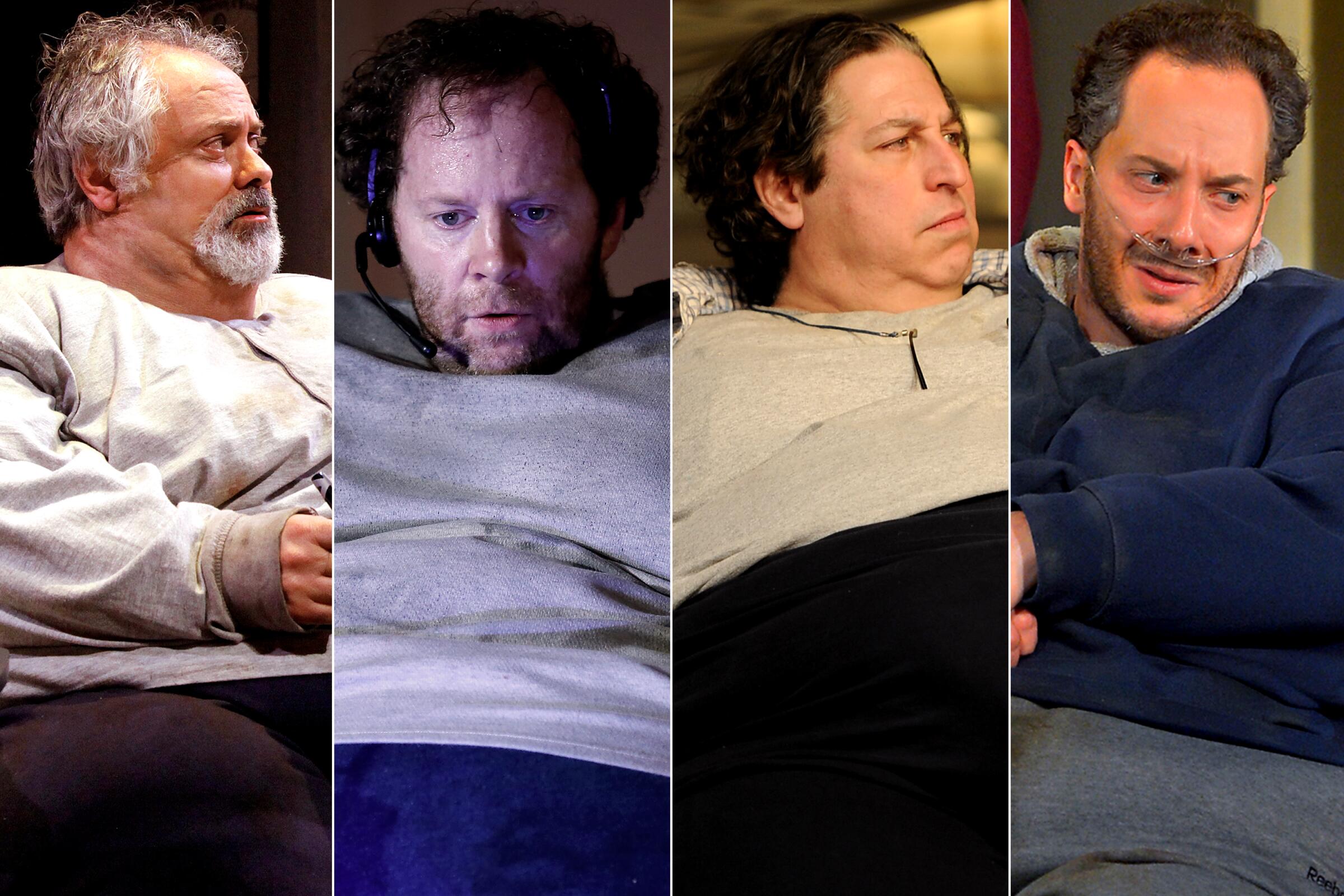
- Copy Link URL Copied!
The following contains spoilers from the movie “The Whale,” now playing in theaters.
The movie version of “The Whale” ends with a breath, a bright light and a beach. The last visual shows the sun shining, the tide rising and falling, and a younger, slimmer version of the lead character, Charlie, staring out into the ocean as his daughter plays in the sand behind him.
If the serene seaside scene confused you, you’re not alone: That final flashback was a surprise to playwright and screenwriter Samuel D. Hunter, as director Darren Aronofsky tacked it on without discussing it with him. But the ending’s overall effect echoes the final moment of its source material, which actors and directors who’ve staged the popular play consider to be a release that, when performed, feels communal and generally satisfying for the audience in the room.
“The way it’s structured, this play is designed to slowly and repeatedly turn up the pressure until it almost can’t be tolerated,” said Davis McCallum, who directed a 2012 off-Broadway staging at Playwrights Horizons. “And then it has this really cathartic release at the end of the piece — a blackout, a sound effect, and a moment where the audience just lived in that silent darkness together.”
Both the play and the movie “The Whale” center on Charlie (Brendan Fraser), a reclusive, morbidly obese instructor of online writing classes who has been eating himself to death since the passing of his lover, a casualty of religious homophobia.
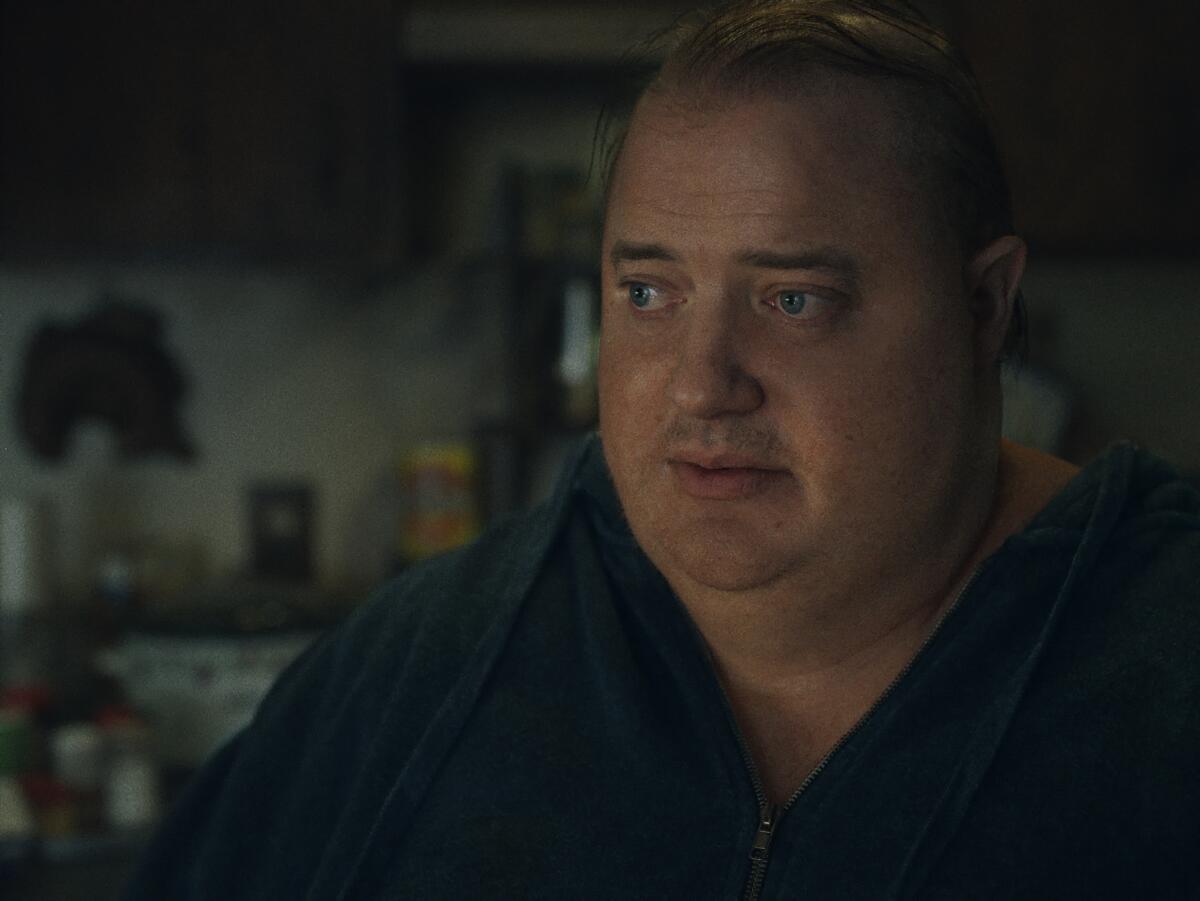

Review: Does Brendan Fraser give a great performance in ‘The Whale’? It’s complicated.
Darren Aronofsky’s intimate chamber drama, adapted by Samuel D. Hunter from his own play, navigates a tricky line between empathy and exploitation.
Dec. 8, 2022
The character is an amalgamation of Hunter’s past lives: as a closeted gay kid attending a fundamentalist Christian school in rural Idaho, a depressed adult who silently self-medicated with food, and an expository writing instructor for college freshmen (the piece’s heartbreakingly honest line “I think I need to accept that my life isn’t going to be very exciting” is an actual submission from one of Hunter’s students).
Throughout “The Whale,” Charlie is visited by his estranged and troubled daughter, Ellie (Sadie Sink) , and his frustrated ex-wife, Mary (Samantha Morton), both of whom Charlie abandoned when he ended his marriage and came out as gay; Liz (Hong Chau) , a conflicted caregiver who is also the sibling of Charlie’s late lover; and Thomas (Ty Simpkins), a fundamentalist missionary who is far from home. Hunter doesn’t shy away from any of the issues the characters are dealing with “but doesn’t bury you in [them] either,” said Martin Benson, who directed a 2013 staging at South Coast Repertory. “He’s not advocating anything, he’s just writing what he believes is true.”
These characters and their concerns are similar to those in Hunter’s other plays, which tackle subjects “fundamental to Greek tragedy: the limitation of humanity’s vision, the place of religion in society and the desperate longing for relief from the lonely uncertainty of life,” wrote Times critic Charles McNulty when Hunter received the MacArthur “genius” grant in 2014. “He proceeds not with a moral point but through observation of the way his characters either defend their bunkered existences or attempt to reach beyond them — or more commonly, some combination of the two.”
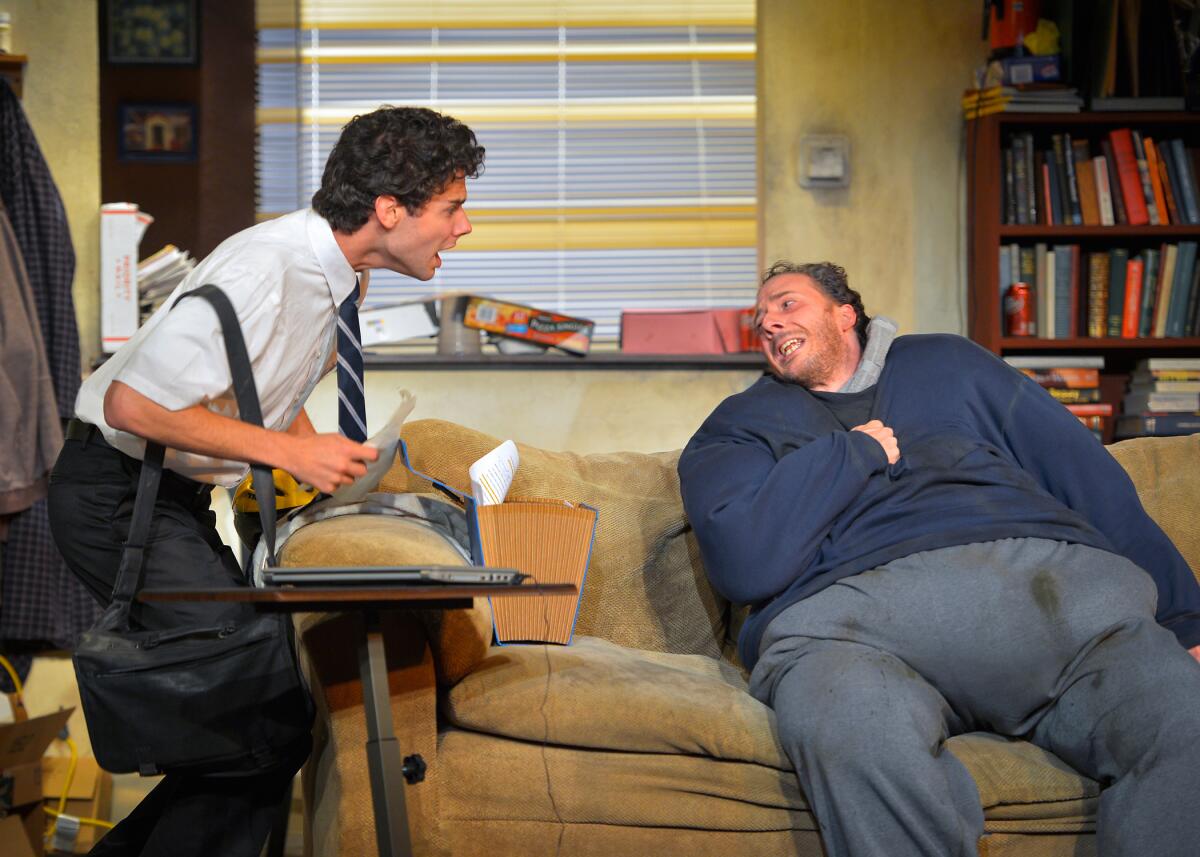
Throughout the intimate live piece — which is staged without the escape of an intermission — all five characters reveal truths to each other and the audience that raise the stakes of their potential bonds.
“These deeply flawed characters actually care about each other so much, but there are so many obstacles for them to express that love or connect with one another in real ways, however desperately or destructively,” said Joanie Schultz, who directed a 2013 production at Chicago’s Victory Gardens Theater. “So when some of them finally do, it’s gorgeous and almost magical.”
Numerous stagings of “The Whale” accentuate the pressure-cooker effect by designing Charlie’s living room, where the entirety of the play unfolds, with an extra sense of claustrophobia or isolation. For example, the 2014 Bay Area run raised the Marin Theatre Company stage by four feet and angled Charlie’s ceiling so that, from the audience’s perspective, the character appeared to “dominate the space in a way that intimidated the people who visited him,” said director Jasson Minadakis.
Likewise, the off-Broadway version strategically lit the space “so that it felt as if his room were hovering in this dark void,” said director McCallum; the Chicago staging positioned the proscenium “like an island in the sea, which was really effective because they’re all alone on their own islands in some ways, with all these barriers to connection,” said director Schultz.
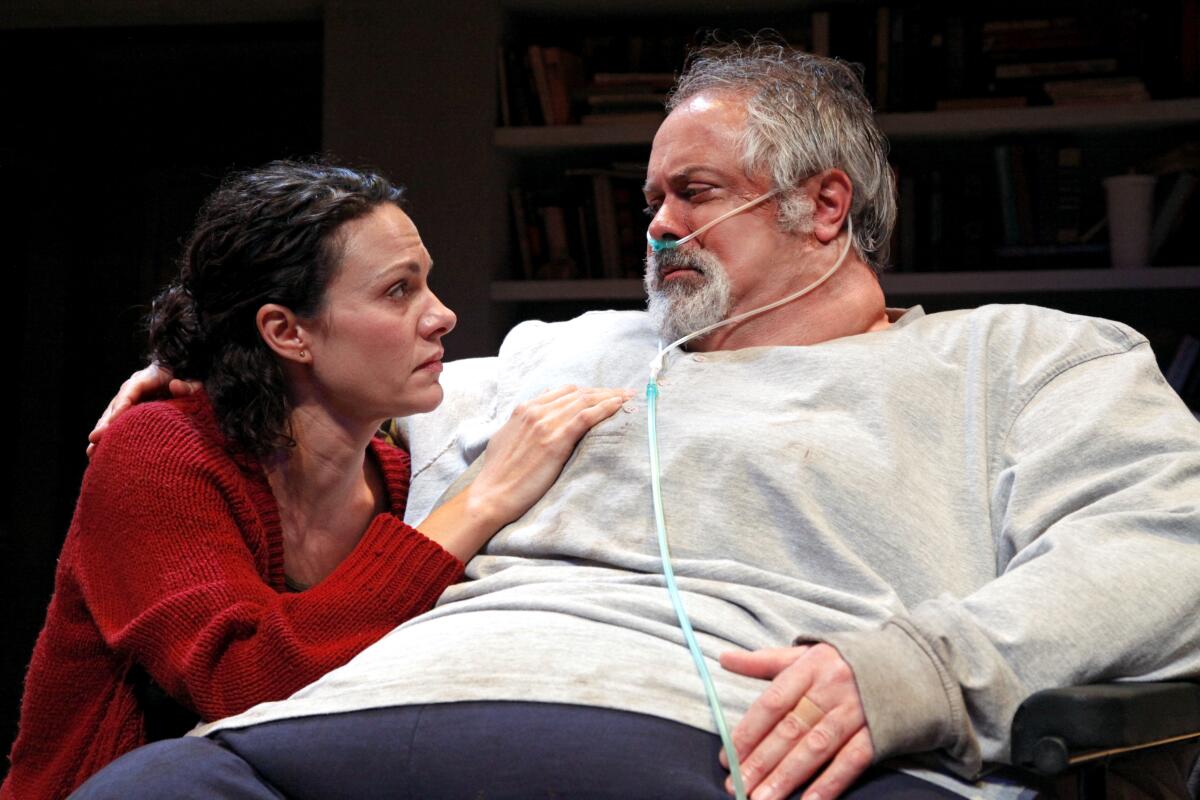
Darren Aronofsky on ‘The Whale,’ fatphobia and empathy
Director Darren Aronofsky dives deep on “The Whale,” fatphobia, human connection and how he feels about Brendan Fraser and Sadie Sink.
Dec. 13, 2022
Within these confined spaces, the actors who played Charlie — each wearing body suits weighing anywhere from 30 to 100 pounds — charted his arc physically and emotionally. As he attempts to nudge daughter Ellie toward a place of authentic self-expression, he too reveals himself to his students. The intention is that, by the time Charlie shares that he’s giving his life savings to Ellie, and endures great pain to stand up and walk toward her as she reads her “Moby-Dick” essay aloud to him, the audience would feel the overwhelming fulfillment Charlie gets during his final breath in the play.
“Every night, it was a journey, and it wasn’t easy to watch or to perform,” recalled Tom Alan Robbins, who starred in the 2012 world premiere in Denver. “His goal is self-destructive, but you want the audience to understand what has driven him to do this, and that his redemption is in the relationship he tries to forge with his daughter. You want that last second to be a combination of incredible pain and incredible triumph because, however briefly it is that they connect, it’s still an achievement for him.”
“Ellie says terrible, devastating things to Charlie throughout the whole thing, but he loves her so much that it doesn’t even hurt him,” said Matthew Arkin, who played Charlie at South Coast Repertory. “So in that final moment, whatever flaws he had, whatever mistakes he made and in whatever ways he couldn’t love himself enough, he lived a life redeemed, because he gave everything to save his daughter.”
Whether Charlie dies at the end of “The Whale” is up for debate. As written in Hunter’s script, the stage directions of that breath simply read, “A sharp intake of breath. The lights snap to black.” Many theater makers say that breath could very well be his last inhale, after which he is finally freed from the pains of his body, his loneliness, his grief. “The love and connection that Charlie gives Ellie is a gift, and hopefully she will remain true to her voice and herself in a way that he gave up on,” said Hal Brooks, who directed the Denver premiere.
It also could be considered in a metaphorical way, mimicking “how whales immerse themselves for so long underwater and then they finally come up to the surface,” said Schultz, or “a deep intake of breath before diving in somewhere they’ve never gone before,” said Shuler Hensley, who played Charlie in the New York run as well as a London staging in 2018. “It’s a brilliant ending, because audience members have constantly told me they couldn’t breathe afterwards. They didn’t know what to do, whether to applaud or get up or move because they’ve become so connected to Charlie.”

When asked about the ending, Hunter didn’t clarify Charlie’s status because, he said, it’s not necessarily relevant. “The final moments of this play and this movie abandon realism a little bit, and it’s no longer about this guy in this apartment,” he explained. “What matters is that he’s connected with Ellie, he’s done the thing that he’s been trying to do throughout this entire play, and that connection feels real and genuine. There’s this apotheosis that happens, and in the film, Charlie literally ascends off the ground.”
Though Hunter didn’t write the beach scene that follows Charlie’s onscreen ascension, he called it “marvelous” and shared an interpretation of what it might mean: “If it’s a flashback to the last time Charlie went swimming in the ocean, close to when the family fell apart, what I see in that shot is a man staring down the abyss of self-actualization, contemplating the decision he has to make about the different avenues he can take.
“Maybe he was thinking about what would happen if he stayed in that marriage: Ellie would have grown up with a closeted father, [his lover] Alan would have been miserable and, as Liz points out, would have probably died way before he did when he was with Charlie,” Hunter continued. “Choosing to stay or leave, both paths are complicated and tragic in their own ways, but ultimately, I think Charlie took the more hopeful route, and chose to look for the salvation one can find through human connection.”
Only good movies
Get the Indie Focus newsletter, Mark Olsen's weekly guide to the world of cinema.
You may occasionally receive promotional content from the Los Angeles Times.

Ashley Lee is a staff reporter at the Los Angeles Times, where she writes about theater, movies, television and the bustling intersection of the stage and the screen. An alum of the Eugene O’Neill Theater Center’s National Critics Institute and Poynter’s Power of Diverse Voices, she leads workshops on arts journalism at the Kennedy Center American College Theater Festival. She was previously a New York-based editor at the Hollywood Reporter and has written for the Washington Post, Backstage and American Theatre, among others. She is currently working remotely alongside her dog, Oliver.
More From the Los Angeles Times
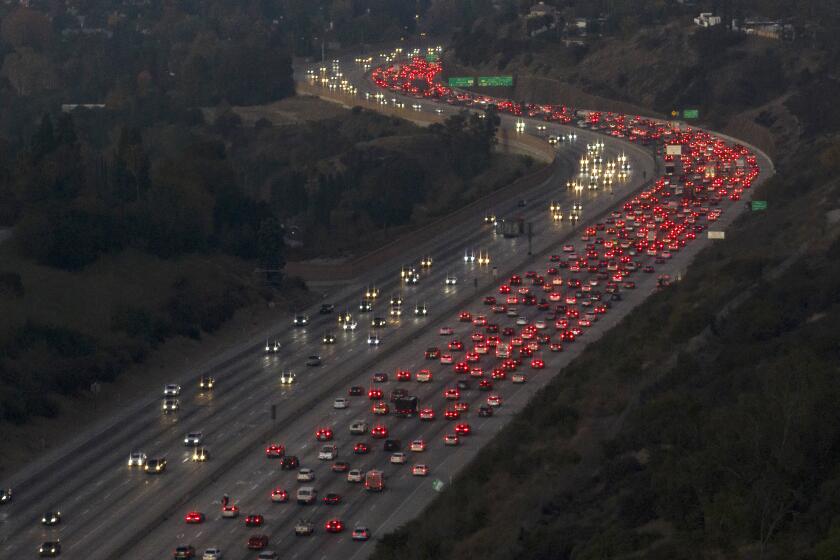
California auto insurance rates are skyrocketing: Here’s why and how to save
Aug. 17, 2024

This must be West Adams
Aug. 16, 2024

Housing & Homelessness
This Orange County city has the hottest housing market in the country
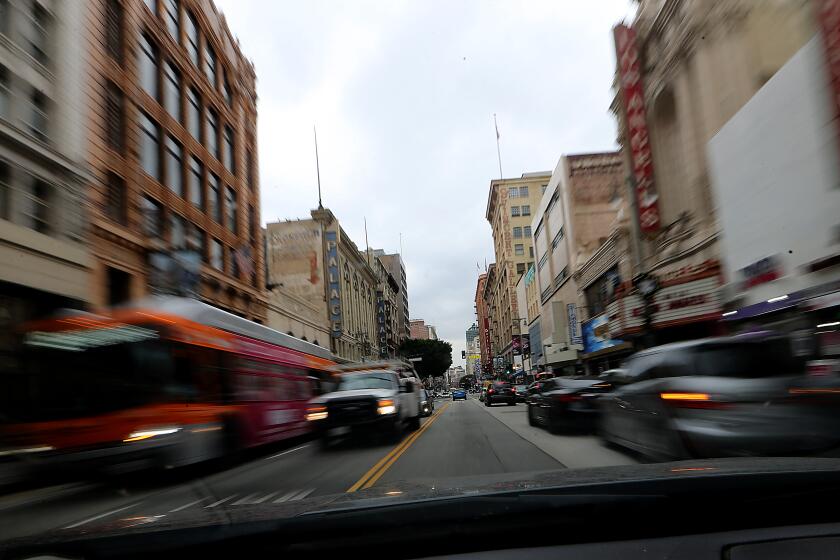
Los Angeles’ building earthquake retrofit data have been outdated for years, Times investigation uncovers
- Search Please fill out this field.
- Newsletters
- Sweepstakes
The Whale ending explained: Brendan Fraser breaks down Charlie and Ellie's final scene
Fraser explains his interpretation of what the last exchange between Charlie and Ellie (Sadie Sink) means for both characters: "He's liberated."
:max_bytes(150000):strip_icc():format(webp)/Screen-Shot-2022-10-06-at-3.48.51-PM-8497e41336df4c778e870b3d01e8ea48.png)
Warning: This article contains spoilers for The Whale .
It's easy to get swept up in the emotions of Darren Aronofsky 's searing drama The Whale , which follows Brendan Fraser as Charlie, a reclusive, 600-pound literature professor struggling, in the last days of his life, to reconnect with the teenage daughter, Ellie ( Sadie Sink ), whom he abandoned years prior. The film's conclusion, however, might be more difficult for some viewers to read, so we asked Fraser and screenwriter Samuel D. Hunter to break down what the final scene means for Charlie's journey.
The film slowly builds to a key moment for the father-daughter pair, after Charlie spends most of the movie defending Ellie's sporadic outbursts and prickly, wounded disposition — particularly to his longtime caregiver and friend, Liz ( Hong Chau ). Charlie maintains that Ellie, like most people, has an innate capacity for empathy, and regularly heralds one of her blunt, years-old school essays criticizing the classic novel Moby Dick . He see it as a signifier of her purity, honesty, and unbridled passion. Still, Ellie remains skeptical of Charlie during most of the film's running time.
"Ellie torments him, when she cases him out the fist time she sees him," Fraser observes, noting a specific piece of blocking. "You notice that she stands behind him. She knows he can't look over his shoulder. She's torturing him a little bit. She's cross, she's angry for the sadness she feels, and that's how this 17-year-old brilliant kid comports herself. She goads him into taking to his feet, knowing well that he likely can't and that it would make him very uncomfortable to do that without even having the assistance of his walker — but she takes it from him anyway and makes him prove himself, and he can't."
That scene, Fraser says, is key to understanding the film's conclusion, which brings Ellie and Charlie together for a genuine connection, as she reads the essay aloud. Again, Charlie attempts to rise up and walk toward her. That's where things get fantastical, as Fraser calls the final sequence an act of "contrition" for Charlie, in which he's "liberated" after finally breaking through her defensive armor, reaffirming to Ellie that he sees her for the person she is — and always was.
"It's important because it's a Herculean effort that he makes to even get to his feet," Fraser says. "For him to finally break through to her, humble himself before her, and let her know that he made a mistake and is sorry for it. While his life has not physically ended in that moment, I think that he knows he doesn't need to live any longer, which is why he takes off his breather, he's got her reading the essay, and he does take to his feet like three Olympic dead-lifters, takes his baby steps to his baby, and in that beautiful two-shot, a great white light appears, and they look skyward. Depending on your belief system, spiritually or otherwise, we see that Charlie — with a touch of magic realism — finally does fly."
Screenwriter Hunter calls the run-up a "hero journey where he gets the elixir."
"He's struggling this entire film to put a mirror up to his daughter to say, 'This is who you are,' and in those final moments, that mirror is this essay," Hunter explains. "When she looks at it, she can't deny turning it in and getting a D, but then, here's her father, all these years later, being like, 'This is the best essay I've ever read.' At long last, he's the only person who sees her, and she knows it."
As for whether Hunter feels Charlie is actually walking in the final shot, he says it's open for interpretation.
"I think it's an apotheosis — you can take it how you want it," he says. "In the play, the way I wrote it is that you hear a sound of waves and they slowly intensify through that scene, so, there's a way to read it both ways. It wants to be miraculous, either literally or figuratively, and I think you can watch it either way."
You can watch and interpret for yourself: The Whale is now in theaters nationwide via A24 . See Fraser explain the movie's ending in the video above.
Want more movie news? Sign up for Entertainment Weekly 's free newsletter to get the latest trailers, celebrity interviews, film reviews, and more.
Related content:
- Brendan Fraser's emotional performance will move you to tears in new trailer for The Whale
- Golden Globes nominate Brendan Fraser after The Whale star said he won't attend ceremony
- Brendan Fraser praises Encino Man costar Ke Huy Quan for 'performance of his lifetime' in Everything Everywhere All at Once
- Brendan Fraser tears up discussing his kids and The Whale : 'I have as much love as I'll ever need'
- Brendan Fraser reveals why he turned down Disney's George of the Jungle sequel
Related Articles
Screen Rant
Brendan fraser shares his interpretation of the whale’s final scene.

Your changes have been saved
Email is sent
Email has already been sent
Please verify your email address.
You’ve reached your account maximum for followed topics.
All 7 Horcruxes In Harry Potter & How They Were Destroyed
"we're taking the stephen king book & adding a lot of fun": glen powell explains edgar wright's remake of the running man, george lucas changed hollywood forever with the phantom menace, & we've all forgotten just how ground-breaking it was.
Warning: This post contains spoilers for The Whale. Brendan Fraser breaks down his interpretation of The Whale 's ending after it concludes on an ambiguous note. The Whale premiered on December 9 and is an emotional psychological drama starring Fraser. It has been touted as Fraser's comeback film after he disappeared from the Hollywood scene for many years. The Whale follows Charlie (Fraser), a morbidly obese man who tries to reconnect with his estranged daughter, Ellie (Sadie Sink). The film has received mixed-to-positive reviews so far, with critics being nearly unanimous in their praise of Fraser's performance. However, the film has received some criticism for director Darren Aronofsky's melodramatic adaption of Samuel D. Hunter's 2012 play of the same name.
In an interview with Entertainment Weekly , Fraser and Hunter (who also wrote the film's screenplay) shed some light on the ambiguous ending of The Whale . For many viewers, the scene may seem tragic and to others, the religious undertones may evade their understanding. Hence, Fraser and Hunter discuss how they interpreted the ending and how it was a hero's ending for Charlie, one in which he found liberation. Check out their statements below:
Fraser: It's important because it's a Herculean effort that he makes to even get to his feet. For him to finally break through to her, humble himself before her, and let her know that he made a mistake and is sorry for it. While his life has not physically ended in that moment, I think that he knows he doesn't need to live any longer, which is why he takes off his breather, he's got her reading the essay, and he does take to his feet like three Olympic dead-lifters, takes his baby steps to his baby, and in that beautiful two-shot, a great white light appears, and they look skyward. Depending on your belief system, spiritually or otherwise, we see that Charlie — with a touch of magic realism — finally does fly. Hunter: He's struggling this entire film to put a mirror up to his daughter to say, 'This is who you are,' and in those final moments, that mirror is this essay, when she looks at it, she can't deny turning it in and getting a D, but then, here's her father, all these years later, being like, 'This is the best essay I've ever read.' At long last, he's the only person who sees her, and she knows it.
Related: The Whale Confirms Sadie Sink Is Stranger Things' True Breakout Star
What Happens In The Whale's Ending
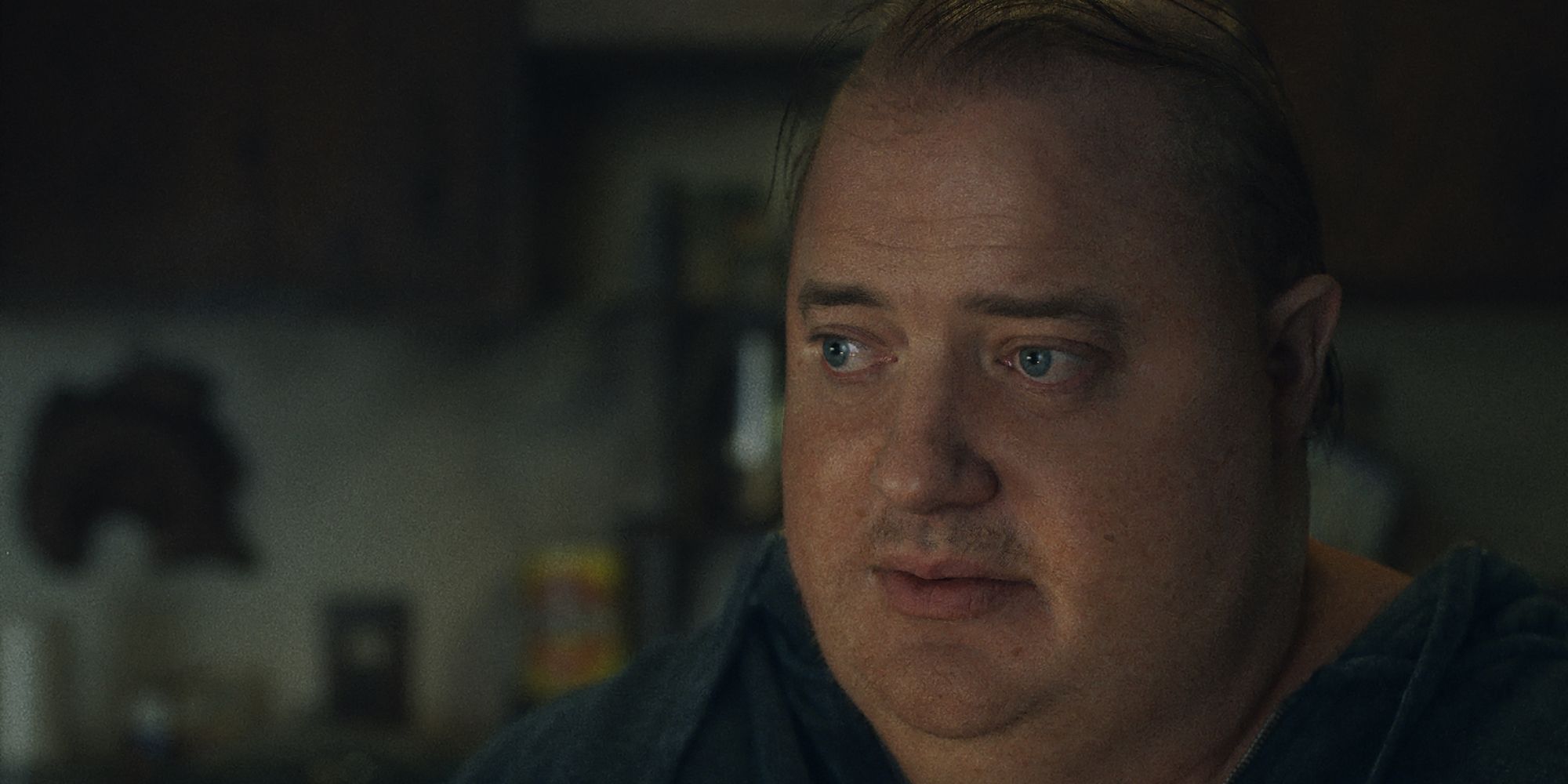
Fraser and Hunter's explanation of the ending will be welcomed by some, as The Whale 's final scene is a bit difficult to understand on paper. Before the ending can fully be explained, Fraser reveals that viewers needed to understand an earlier scene in the film. That particular Whale scene was one in which Ellie and Charlie first begin spending time together after Charlie agrees to help her write an essay for school. Ellie, still hurt at being abandoned by her father, tries to hurt him back by challenging him to walk. Unfortunately, at that point in The Whale , he can't stand or walk, and is therefore unable to prove himself to her.
In the final scene of The Whale , Ellie confronts Charlie about switching out her essay with an essay on Moby Dick she wrote in 8th grade. Charlie switched out the essays because he finally saw her and understood that the latter essay was an expression of herself. Though Ellie is defensive at first, the two end up attempting to connect one last time. To do so, Charlie asks Ellie to read the essay to him. As she does so, despite his health failing him, Charlie manages to stand and walk toward her. He is finally able to prove himself to her. However, the effort of walking is more than Charlie can withstand, and he dies as Ellie reads the essay. In the end, a bright light seemingly shines down, which could be interpreted literally as Charlie ascending to heaven or figuratively to prove that he has been redeemed.
Ultimately, The Whale 's ending has many layers to it, and it is tragic in some sense. However, Fraser and Hunter point out that the underlying theme is redemption and liberation. In the end, Charlie is willing to accept his death because he has accomplished the one goal that he had, which was to prove to his daughter that she is seen and understood. It is also an extremely touching portrayal of the relationship between a parent and a child. Even though Charlie failed Ellie in many ways, he proved that his parental instinct and love for his daughter never faded as he was able to see the value and the piece of his daughter within a years-old 8th grade essay. According to Fraser and Hunter, The Whale 's ending isn't ambiguous or tragic but hopeful for all the parents out there seeking redemption.
Next: Why The Whale Is Controversial, Despite Brendan Fraser's Comeback

The Whale (2022) Ending Explained – What happens to Charlie?
[trigger warning – suicide]
The Whale Plot Synopsis
The Whale is a one-room play adapted for the big screen by Darren Aronofsky and stars Brendan Fraser in what is considered his comeback movie in Hollywood. The melodrama is a heartwrenching tale of Charlie, an English teacher who has let himself go and gotten morbidly obese after the passing of his partner.
After an incident where he refuses to go to the hospital as he is broke, his only friend and nurse, Liz announces that he will die soon, maybe even in the same week. Charlie must tie up all loose ends including reaching out to his estranged daughter who is not about to make things simple for him.
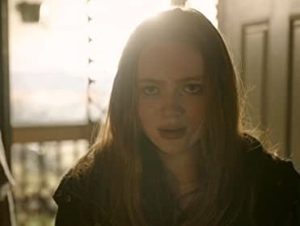
What is the Moby Dick essay?
When we first see Charlie, he gets some kind of attack while he is jerking off to porn. As he thinks he is dying, he tries to read an essay on Moby Dick but it falls to the ground. At that moment, a New Life missionary, Thomas comes knocking and Charlie begs him to read the essay for him. As Thomas reads it, Charlie calms down and says he wanted to hear it one last time as he thought he was dying.
That night, Charlie recites the essay by heart which describes Moby Dick, the whale as a poor big animal. The essayist also feels for Ahab because he thinks his life will be better if he kills the whale, but it will never help him and Charlie relates to both characters. The writer also finds the chapters which spend pages describing the whale boring and as an English teacher, Charlie finds the honesty refreshing. It is later revealed that the essay was written by his daughter, Ellie.

Why does Ellie start hanging out with Charlie?
Ellie is the angry teen daughter of Charlie with his ex-wife Mary who makes her classmates cry, is sarcastic and is bad at school. They did not see each other after she turned 8 as Mary got full custody after Charlie had an extramarital affair. As he is told he is dying, Charlie reaches out to Ellie who shows up and is constantly rude to him. She is angry at him for leaving her and cheating on her mother and for never staying in touch.
Charlie tries to reconcile in any which way possible and so offers to pay her $120,000 and help her with school in exchange that she should hang out with him. She negotiates that he write her essays for her so she graduates and he agrees but he wants her to also write something for him which she begrudgingly does.

Who is Alan and what happens to him?
Alan was Liz’s brother and was part of a New Life church that his father ran. Alan truly believed in the church and even went to South America to do missionary work. And while he was lonely and tired, he did not want to come back home as his father had arranged his marriage to a girl he did not know.
When Alan did come back, he came with a partner which angered his father who kicked him out of the church. With the church being his life, it got to him as Alan did not eat or sleep in his last few days. Finally, one day he was found dead in the river. While his father called it an accident, Liz and his partner felt that he had killed himself.
Turns out, the partner was none other than Charlie. Alan had been a student in the night school where Charlie taught. While he was an adult, Charlie knew that it was wrong but he was in a bad space when he was married to Mary. Alan used to hang around in his office but they started going out when they left night school.

Why does Ellie keep taking everyone’s photo?
When Ellie first starts visiting, she randomly takes photos of Charlie and Thomas in unflattering scenarios. After she threatens Thomas into smoking marijuana and takes his photo, he is upset and locks himself in Alan’s room. As he starts opening up to her, she secretly takes an audio recording of him.
She finds out that he is not from New Life because they stopped doing door-to-door and she asks him about it. He reveals that he was a missionary but in Waterloo. His father wanted him to leave when he found out he was a stoner. But Thomas left because he didn’t like how his church worked, simply handing out pamphlets. He wanted to truly help people and thought personal interactions would be better.
He started doing door-to-door preaching and when he told Jerry, the leader they got into an argument. In a fit of rage, he took the petty cash of $2,400 from the church and left. He says he wants to save at least one person and thought it could be Charlie. However, he’s almost out of money and he can’t go back because he will be disowned. Ellie then ends up tracking down Thomas’ parents and sends them the audio recording.
Meanwhile, her mother Mary shows Charlie the photos she takes, she puts them up on social media and adds insulting captions. She calls Ellie evil while Charlie just thinks she is honest. While Ellie doesn’t verbalise her motives behind it, she ends up intentionally or unintentionally helping Thomas.
The young missionary comes and tells Charlie about Ellie tracking down his parents. But the twist is that they forgive him, are not mad about him stealing the money and want him to come back home. While Charlie is dying, he has an epiphany and claims that Ellie was not trying to hurt Thomas but help him as people are inherently good.

What spurs Charlie’s breakdown?
Mary comes with Liz when she hears about Ellie hanging out with Charlie and is shocked to see his appearance. She ends up telling Liz about the $120k he had been saving for Ellie who is upset as she thought he was broke. Liz angrily tells him that they could have gotten him anything he needed for his health. She had even declined his money when her truck broke down as she thought he was broke and would walk through the snow to get him food. Without waiting to hear Charlie’s reasoning, she leaves.
In the meantime, Ellie says she hates Charlie and leaves with the essay he wrote for her.
Mary and Charlie are left alone and as she drinks she explains that after she took full custody, she kept their daughter away because Ellie is awful and thought he would think Mary was a bad mother. Then she kept her away because she didn’t want Ellie to hurt Charlie.
Charlie tells her he reached out because he is dying and she is angry. She tells him to go to the hospital and he says the money is for Ellie. He asks her to make sure Ellie grows up to be a good person but she leaves without promising it. Meanwhile, Dan the delivery guy who was always nice to Charlie, waits to see Charlie’s appearance at the next delivery by tricking him and is disgusted.
Charlie doesn’t think much of it but then he sees Ellie’s post about him being fat that Mary had left open on his laptop. He had commended her honesty and feels angry at those who are fake like Dan. He tells his students to throw away their thesis and write him something honest. He then finishes every food item in the house and pukes it out.
At that moment, Thomas comes and tells Charlie the truth about himself. He says while he did something wrong, it brought him to Charlie and that he can save him as he pulls out Alan’s Bible that he had found in his room. He says that Alan didn’t live for the spirit but in the flesh aka committing homosexuality which is why he died.
After Charlie confirms that Thomas is being homophobic, he gets angry and starts recounting how they dated and made love and describes his body which disgusts Thomas who runs away.

Does Charlie die?
Charlie refuses to go to the hospital or make any changes to his lifestyle at the beginning of the film after his blood pressure shoots up and he has congestive heart failure. Liz then declares that Charlie will die soon. His wheezing starts getting worse and he has to breathe through an oxygen tank.
After his breakdown in which he binge eats and gets stressed, his condition worsens. When Liz visits him at the end of the week, his skin is pale and he continuously sweats. At that moment, Ellie barges in and is angry as she failed because of the essay that Charlie wrote for her.
He asks her to read it, and she realises that it is the essay on Moby Dick she had written back in 8th grade. Mary had sent it to him and he apologizes for leaving Ellie and describes her and the essay as amazing. She cries as she wants him to go to the hospital when he cries in pain. But he asks her to read the essay which she angrily does.
As she does, he starts to get up on his own and walks towards her. She reduces the gap between them and as she finishes the essay, he is lifted into the light. It cuts to the flashback at the beach with Ellie which was peaceful memory for Charlie hinting that it is the last memory he saw before he died.
Feel free to check out more of our movie reviews here!
9 thoughts on “the whale (2022) ending explained – what happens to charlie”.
What is Charlie’s last name
Hi @David, no Ellie does not kill Alan. It is hinted that he either died in an accident or committed suicide by drowning. But if you are talking about Thomas, the missionary, Ellie contacts his parents who forgive him and ask him to come home.
Did Ellie kill Alan?
Ellie is so scared by the dessertion of her father, she wants to get everything home. She sends Thomas’s recording to his parents, they forgive him and wants him home. She breaks the plate to feed the birds on the kitchen windowsill, because she wants the bird to go home. She is an unsurprisingly angry teenager, with a Dad who she thinks abandoned her and a Mum who thinks she is evil and I feel for her. She is a good person, but she is angry, hurt and confused too. A story overwhelming about love and loss, but mostly love.
I felt the same way as Ellie’s mother also mentioned that she is evil.
Hey, he sees the Bible that Alan got during his time in New Life. It seems to represent New Life which Charlie blames for Alan’s death; which is why when he looks at it his mood changes.
I want to know what Charlie saw in the locked bedroom after he smelled something and looked towards the bookcase
Do you mean Thomas the missionary? If Mary had said that, yeah it would totally make sense since she sees her daughter as ‘evil’. However, since Charlie is optimistic and always sees the best in people, he definitely sees it as Ellie helping Thomas go back to a forgiving and loving home. And since Mary had gone on and on about how Ellie is horrible for posting mean things about people online, Charlie thinks she is wrong about Ellie’s motives. He thinks Ellie is honest and that people including her have an innate need to help and be kind. This is why he gives that little speech about her and Thomas in the end.
I didn’t get why Charlie talked about Ellie sending Allen “home”. It almost sounded like he was saying she did something fatal to him.
Leave a comment
Save my name, email, and website in this browser for the next time I comment.
'The Whale' Ending Explained: What Happens in Brendan Fraser’s Comeback?

Your changes have been saved
Email is sent
Email has already been sent
Please verify your email address.
You’ve reached your account maximum for followed topics.
'Aliens' Added a Hidden Backstory to This Character From Ridley Scott's Original
One of michael keaton’s most powerful performances is this underappreciated netflix drama, this dark film sets itself apart from other a24 coming-of-age movies.
Editor's Note: The following contains spoilers for The Whale Darren Aronofsky ’s The Whale has already proven to be one of the most controversial films of the year, which isn’t all that surprising considering Aronofsky’s history of making divisive projects. While Brendan Fraser has received widespread acclaim for his powerful performance as the overweight professor Charlie, the film has been perceived as “fatphobic” by some critics. It will be interesting to see where The Whale ends up landing this awards season; some view it as emotionally devastating, while others consider it to be manipulative and overtly cruel.
What Is 'The Whale' About?
The Whale is based on a play of the same name by Samuel D. Hunter , and Aronofsky’s adaptation does a good job of reflecting the intimacy of a stage performance. The film takes place entirely within Charlie’s apartment as his friend Liz ( Hong Chau ) comes to care for him. Charlie has managed to isolate himself from the world; he communicates with his students via Zoom but does not ever show his face. Charlie decides to reconnect with his daughter, Ellie ( Sadie Sink ), who has no interest in him. Charlie agrees to help write her English papers if she will spend time with him and write personal essays from her heart.
Towards the end of the film, Charlie’s world begins to crumble. After making a series of inflammatory messages to his students, he’s fired from his job. His ex-wife, Mary ( Samantha Morton ), confronts him about his relationship with Ellie and criticizes him for his failures in their marriage. After being alerted that he has congestive heart failure, Charlie goes on an eating binge and consumes pizza until he vomits. It’s an emotionally overwhelming experience, especially toward the very final moments of the story.
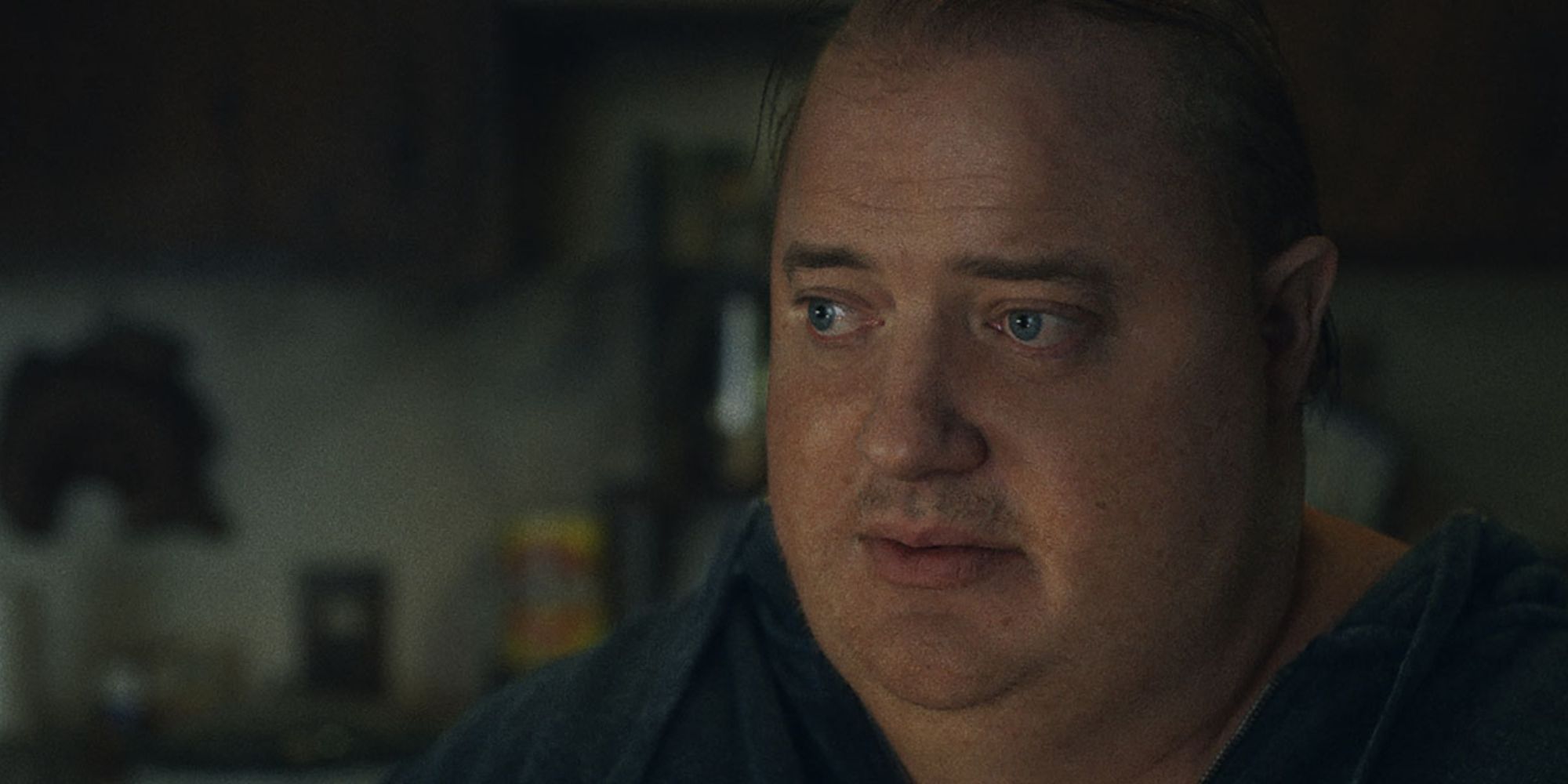
Why Does Mary Not Want Charlie to See Ellie?
As Charlie reveals early on, he is openly gay and was in a relationship with one of his former students, Alan. Following Alan’s death, Charlie began compulsively eating, prompting Alan’s sister Liz to come and take care of him. As part of their arrangement, Mary forbids Charlie from contacting Ellie; she reacts with rage when she realizes he’s asked her to visit him. While Charlie is apologetic for his failure as a father, he does not apologize for his sexuality. In one of the most powerful scenes in the film, Charlie stands up to the missionary boy Thomas ( Ty Simpkins ), whose religion preaches homophobic messaging.
What Happened to Thomas?
As Mary reveals to Charlie, Ellie has been bullying people online through a private Facebook page. Mary feels that she has raised a cruel child and despite how Charlie has hurt the family, Ellie is the true “monster” in their family. In addition to posting pictures of her father, Ellie sends photos of Thomas (a former addict) to his church and family. Despite the seemingly cruel action, Thomas tells Charlie that he has newfound faith in people, as his parents have reached out to forgive him and welcome him home. Thomas also finds a picture of Charlie with Alan and realizes that he only put on the weight as a means of coping with his partner’s suicide.
RELATED: ‘The Whale’ Review: May the “Brenaissance” Continue Beyond Darren Aronofsky's Film
What Happened to Ellie?
Even though her father has been ghostwriting her essays so she can graduate, Ellie lashes out at Charlie when she realizes that he sent in an essay that she wrote when she was younger. Charlie feels that the essay is “honest” in a way that he appreciates, as he’s irritated by his students’ generic responses to his questions and prompts. He’s kept the essay for years and uses it to comfort himself. He tells Ellie how beautiful and talented she is, and for the first time, Ellie believes it. Even though Ellie spends the majority of the story mocking other people, she is in denial of her own talents and insecurities.
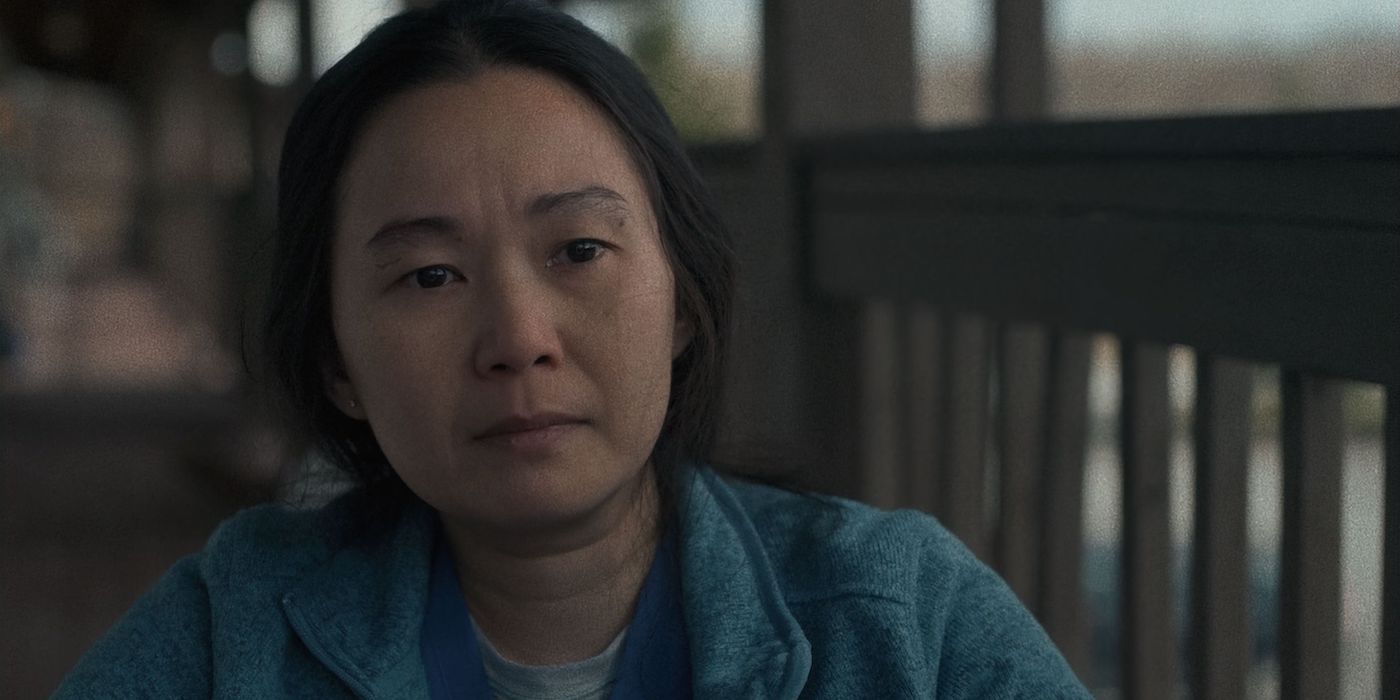
What Was Going on With the Pizza Delivery Boy?
Throughout the film, Charlie orders pizza online and has the delivery boy, Dan ( Sathya Sridharan ), leave it outside his door. While Dan tries to spark a conversation with him because he visits Charlie’s apartment so often, Charlie refuses to step outside and show his face. However, Dan decides to wait on the porch when Charlie comes to pick up the pizza and finally sees him for the first time. His immediate response is to look at Charlie in disgust.
What is Charlie Trying to Do at the End?
Charlie’s ultimate goal is to be completely honest with everyone around him. He refuses to apologize for his homosexuality to Thomas, and chastises him for thinking of him as “disgusting.” He realizes that even though Ellie appears to be cynical, she is really just seeking approval. He even shows his face to his students, and compliments some of the responses that they left in the last message board post that he felt were more honest than their previous work.
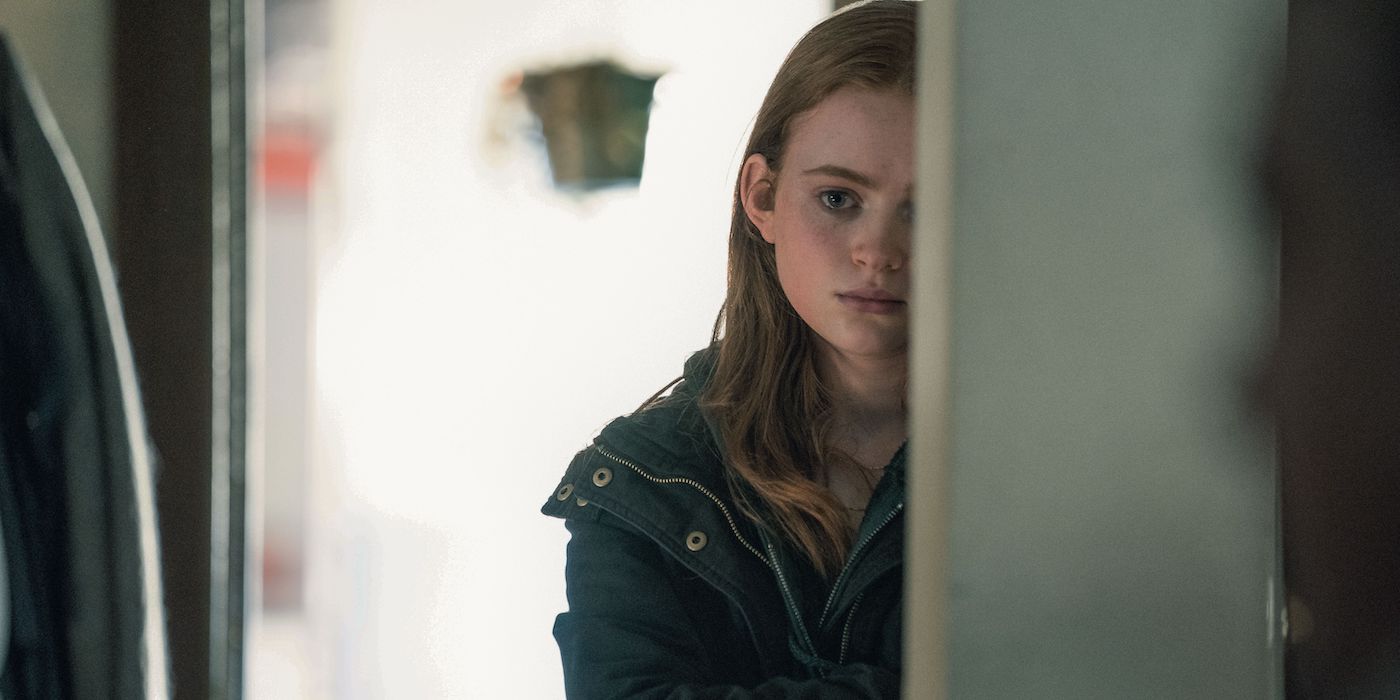
What Is Happening to Charlie in the Film’s Final Moments?
Charlie is dying at the very end and refuses to go to the hospital. As he bonds with Ellie, he attempts to stand. Between the effort of moving and his overall mental state, Charlie dies and ascends into an idealized version of heaven. It’s not the first time that Aronofsky has tackled religious imagery within his films. Both Noah and The Fountain directly deal with faith, spirituality, the afterlife, and the stories of the Bible-inspired mother! While Charlie meets his fate, he’s able to feel accomplished and unashamed.
What are the Differences Between the Play and the Film?
While both the original stage production and the film are very similar, Hunter made some changes to the script when translating it to a feature. Certain elements of the story, such as the Zoom calls and personal photographs, are detailed in a way that wasn’t possible on stage. While the play was released in 2012, the film takes place amidst the 2016 U.S. Presidential Election, as news footage can be seen in the background. The endings are the same, but the film is slightly more hopeful, as Charlie feels that he has accomplished something greater.
- Movie Features
- The Whale (2022)
The Whale Ending, Explained

Your changes have been saved
Email is sent
Email has already been sent
Please verify your email address.
You’ve reached your account maximum for followed topics.
- The Whale is a comeback film for Brendan Fraser, who delivers a highly-praised performance that won him his first Oscar for Best Actor.
- The film polarized critics due to its portrayal of obesity, with some claiming it stigmatizes and mocks fat people.
- The ending of The Whale is open to interpretation, with audiences debating whether the protagonist dies or experiences a symbolic moment of liberation.
The Whale hit the silver screen in 2022, marking the ultimate comeback of fan favorite Brendan Fraser following a few rocky years in his career and personal life. This Darren Aronofsky film, based on Samuel D. Hunter's 2012 play, was in the pipeline for years, as the director struggled to find the perfect actor to star in it. That remained the case until, eventually, he decided to cast Fraser based on his work in 2006's Journey to the End of the Night , a move that couldn't have worked out better: for his performance, the actor was lauded by critics and audiences alike, and took home his very first Oscar for Best Actor, among many, many other accolades. Joining Brendan in an equally brilliant cast are Sadie Sink, Hong Chau, Ty Simpkins, and Samantha Morton.
With a worldwide gross of over $54 million against a $3 million budget, Aronofsky's film became an instant box-office hit and won several awards. However, reviews were quite polarized : while most critics praised Fraser's performance as the finest of his career and had kind words for the rest of the cast, others harshly slammed the film's portrayal of obesity, claiming that it stigmatizes and even mocks fat people. One thing is for sure: The Whale 's ending baffled many moviegoers. Let's break it down.
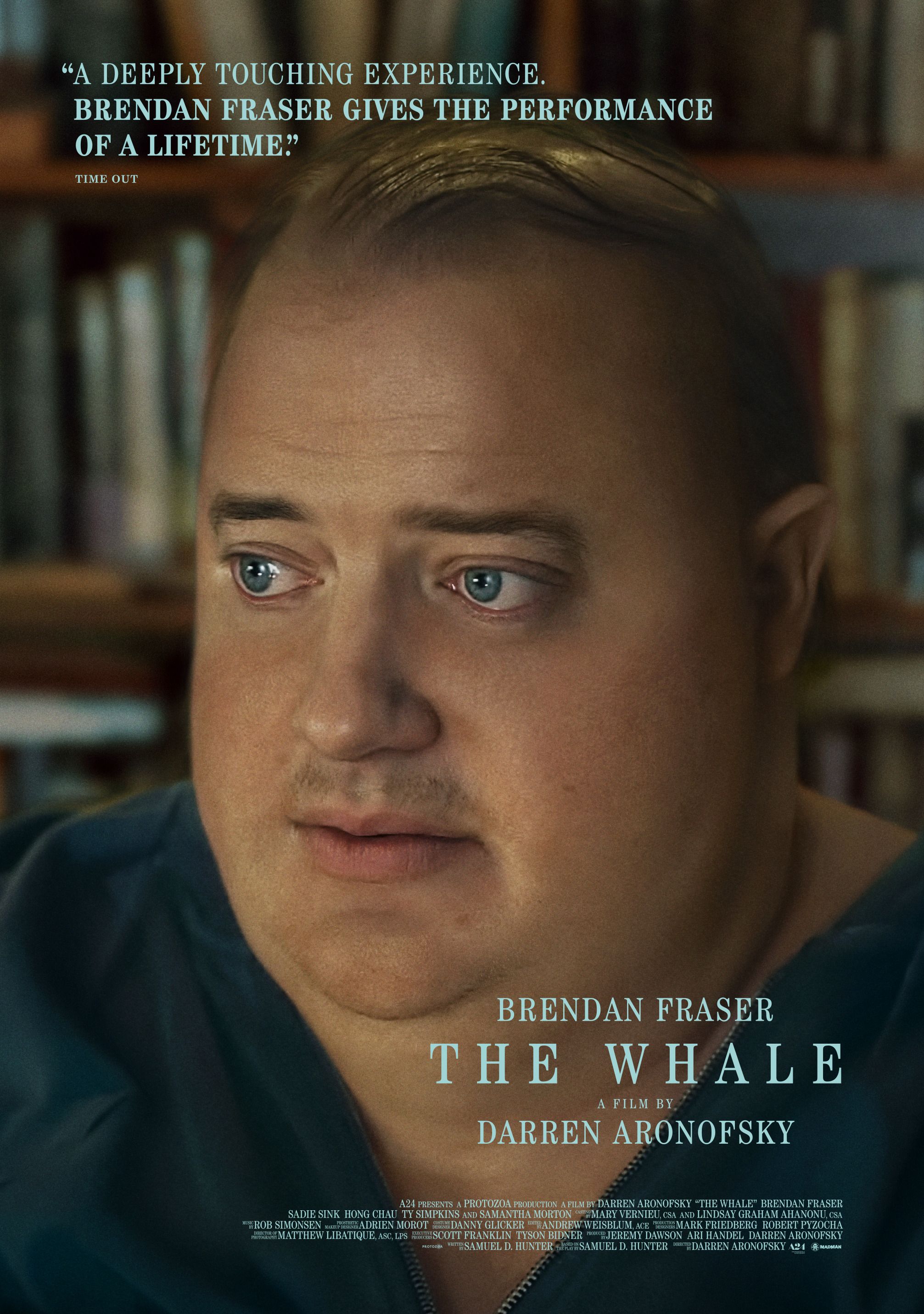
A reclusive English teacher suffering from severe obesity attempts to reconnect with his estranged teenage daughter. Directed by Darren Aronofsky and starring Brendan Fraser.
What Is The Whale About?
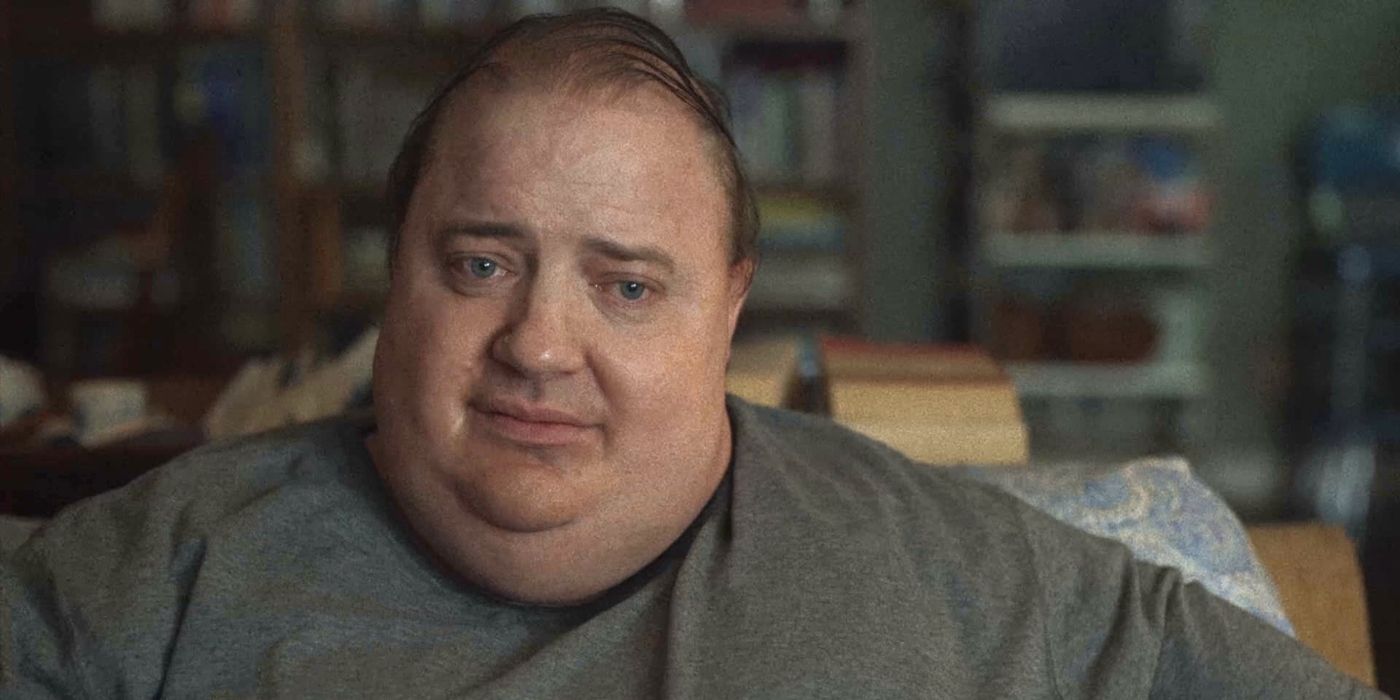
Unlike other films comprising director Darren Aronofsky's filmography , The Whale has a fairly straightforward plot — though, of course, it's not without a certain complexity. It introduces Charlie (Fraser), a morbidly obese English teacher, who lives secluded from society in the privacy of his home, a place that is not quite suited to his needs. His sole connection to the world around him is his computer, from which he teaches college students while keeping his webcam off, as well as frequent visits from his friend Liz (Chau), a nurse who goes out of her way to help him. From the very beginning of the film, it is revealed that Charlie's congestive heart failure is worsening by leaps and bounds, and he has only a few days to live.
Despite Liz's insistence and this bleak prognosis, Charlie refuses to seek medical assistance since, according to him, he does not have the means to do so. Instead, he sets out to rebuild the bond with his daughter Ellie (Sink), whom he abandoned at the age of eight when he left his wife to chase an affair with his former student Alan. In an attempt to get his daughter to forgive him, he offers her a hefty sum of money that he saved over the years, along with doing all of her homework if she spends time with him and writes something honest for him — which she reluctantly accepts.
Related: The Whale Review: Brendan Fraser's Awe-inspiring Performance Keeps Darren Aronofsky's Film Afloat
The Whale essentially provides the audience with a first-hand look at what seem to be the last days in Charlie's life, his overwhelming desire to bond with a daughter who has no interest in him whatsoever, his conflicted relationship with religion explored through his connection with a Christian missionary who seems hell-bent on saving him, and the rampant but useless efforts of the few people around him to get the man to seek medical care once and for all.
What Happens at the End of The Whale?
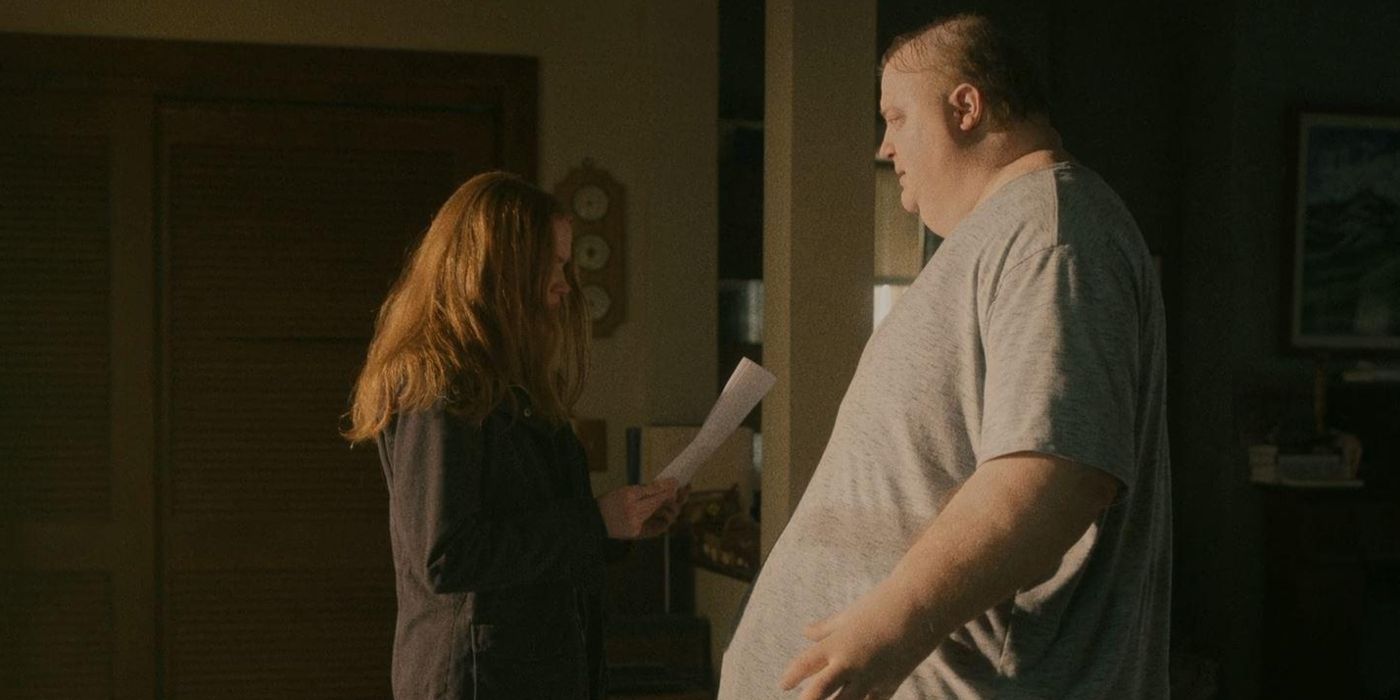
On his deathbed, Charlie gets one last visit from his daughter, enraged that the essay he wrote for her made her flunk. As it happens, he actually replaced the piece with an essay on Moby-Dick written by Ellie when she was just a child, which is how the audience comes to discover why the real author of the essay of such significance to Charlie throughout the film. Realizing he is in his final hour , the man asks his daughter to read it aloud to him one last time in spite of knowing its words by heart, and as she does so, he manages to stand up and walk over to her with remarkable strength, something he had not been able to do the previous days.
Upon reaching Ellie, they both smile at each other, Charlie's feet are lifted off the ground, and he becomes surrounded by a bright white light. Just before The Whale 's credits roll, we get a brief but significant scene featuring a healthier Charlie dipping his feet in the ocean with his infant daughter, playing in the sand and his ex-wife watching them from afar.
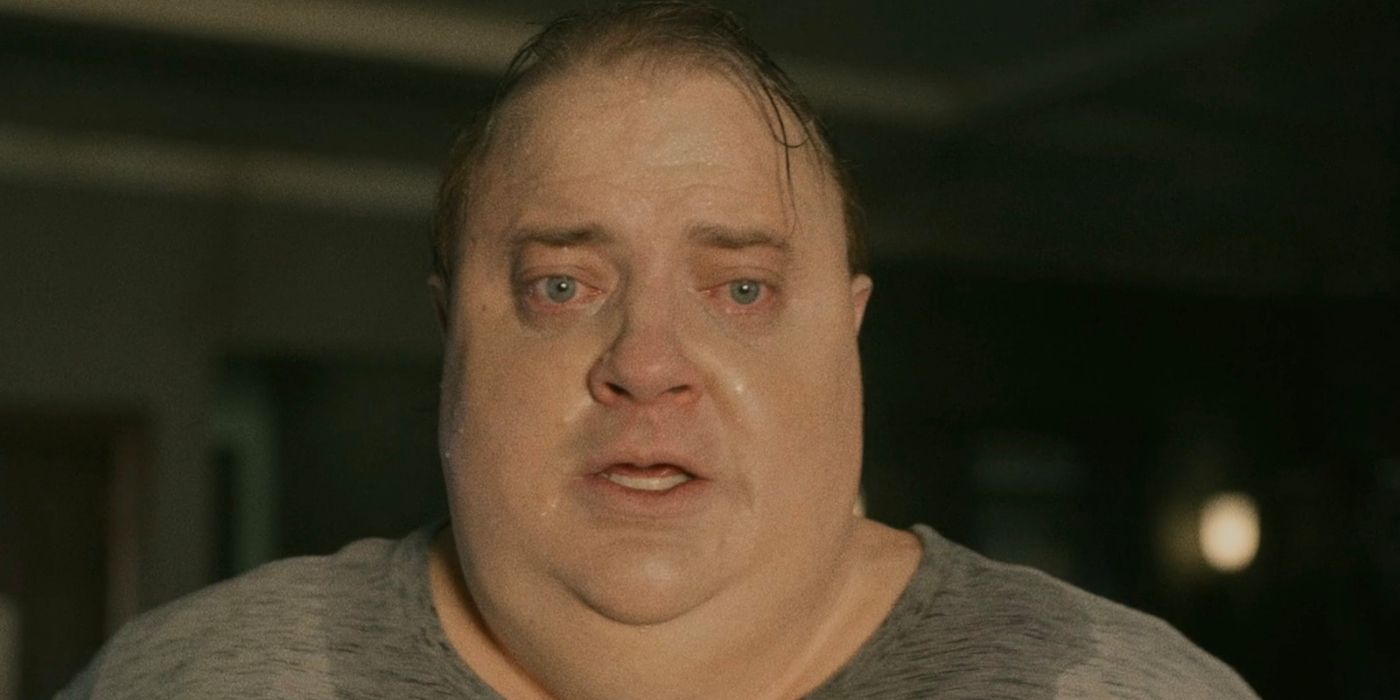
Judging from everything we saw in The Whale , we can deduce that, in the end, Charlie dies, and that this cherished memory of a happier time might be his own idealized version of heaven. Before he dies, he gets the redemption he sought so hard in his final days: Ellie seems to have started to let go of the resentment she holds against him for walking out on her, and Charlie departs this world convinced that he may have turned her life around (though this could very well be his own interpretation of the matter).
But as obvious as this conclusion may seem, Aronofsky makes sure to leave the door open to audiences' interpretation, not only regarding Charlie's tragic outcome, but also the moments leading up to it. This, in a sense, invites us to second-guess the truth of what is unfolding at the end of The Whale . Does Charlie really manage to stand on his own two feet, walk to his daughter, and obtain her forgiveness? Or is this simply a deathbed hallucination before taking his last breath? There are as many possible interpretations of The Whale 's ending as there are people who saw it, yet it's safe to say that this film has certainly left a number of unanswered questions that will continue to spark some very interesting debates.
Related: The Whale Writer Reflects on the Brendan Fraser Film's Success
What The Cast Has to Say About It
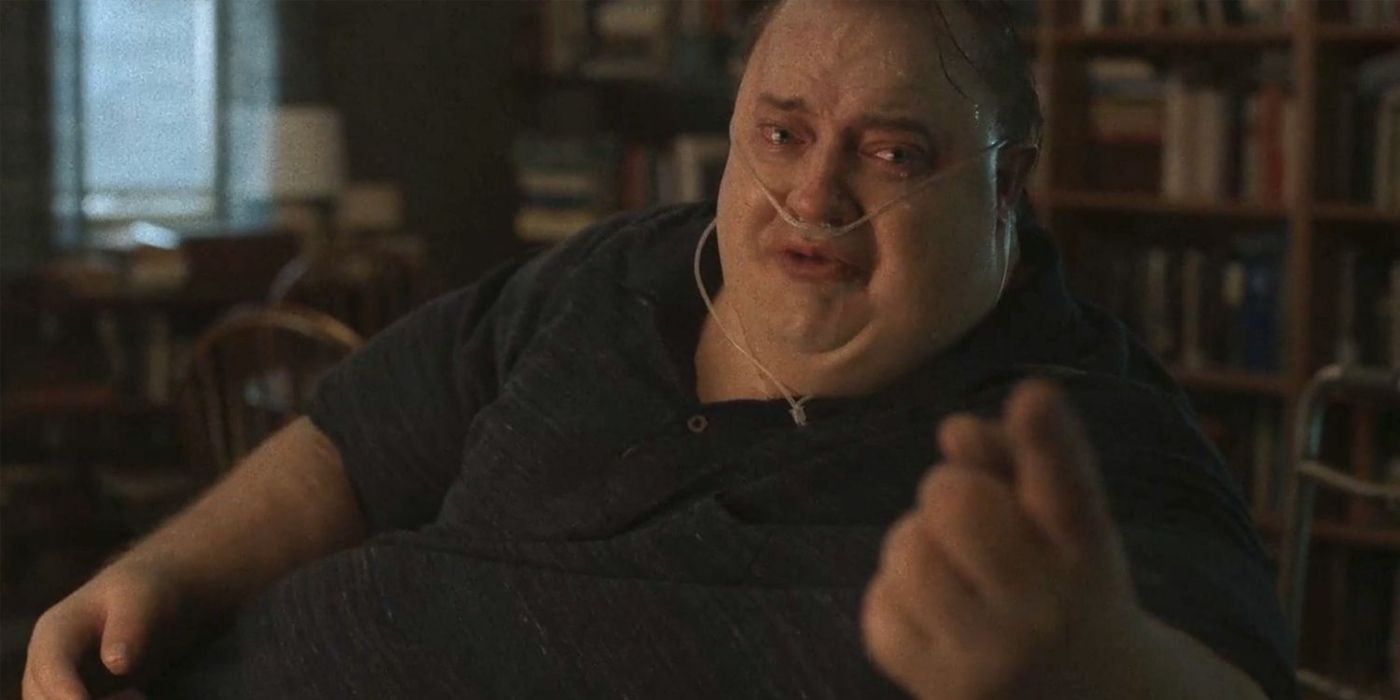
The wonderful thing about films with open or ambiguous endings is that they allow everyone who watches them to come up with their own conclusions, even those who made the movie. Brendan Fraser, in particular, attributed a very different meaning to The Whale 's ending: for him, his character does not die in the final moments, but rather goes through a symbolic moment of liberation as he walks towards his daughter.
"It's important because it's a Herculean effort that he makes to even get to his feet", he told Entertainment Weekly . "For him to finally break through to her, humble himself before her, and let her know that he made a mistake and is sorry for it. While his life has not physically ended in that moment, I think that he knows he doesn't need to live any longer, which is why he takes off his breather, he's got her reading the essay, and he does take to his feet like three Olympic dead-lifters, takes his baby steps to his baby, and in that beautiful two-shot, a great white light appears, and they look skyward. Depending on your belief system, spiritually or otherwise, we see that Charlie — with a touch of magic realism — finally does fly".
Samuel D. Hunter, screenwriter and creator of the original play, also weighed in: "I think it's an apotheosis — you can take it how you want it. In the play, the way I wrote it is that you hear a sound of waves, and they slowly intensify through that scene, so, there's a way to read it both ways. It wants to be miraculous, either literally or figuratively, and I think you can watch it either way".
Stream The Whale on Paramount+
The Whale Ending Explained: Step Into The Light
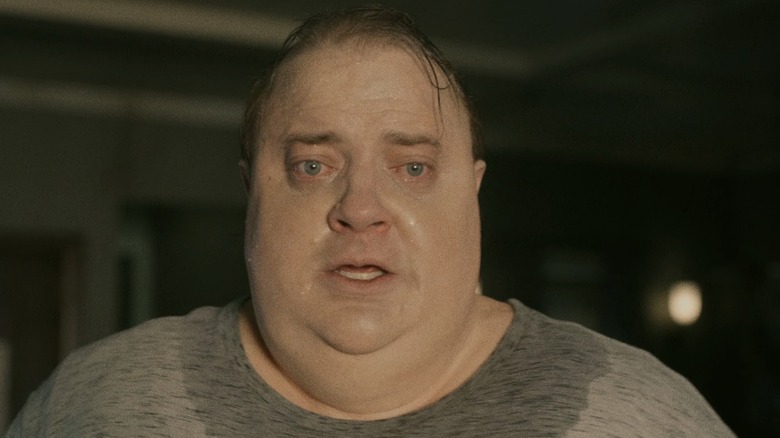
"The Whale," is a controversial and devastating film that seems to be going in an obvious direction, but a growing undercurrent of hope leaves viewers guessing about where exactly our protagonist will end up. Charlie (Brendan Fraser) is an online schoolteacher whose binge eating has cost him his mobility, his health, the possibility of regular human interaction, and any semblance of normalcy. When he finally starts suffering from congestive heart failure and refuses to go to the hospital, he is given a prognosis of just a few remaining days. Charlie doesn't change his ways or seek proper medical attention, but he does finally reach out to his estranged daughter Ellie (Sadie Sink).
At their first meeting in years, the callous teenager challenges her father to walk toward her without the assistance of his walker. He fails at first, but in the final moments of the movie, he actually succeeds. As he makes his way to her, she reads him an analytical essay about Moby Dick that she wrote as a child. She does so at Charlie's request — he recites it to himself often throughout the film. He even has another character read it to him during his first health scare at the beginning of the movie because he wants it to be the last thing he hears before he dies.
Charlie makes his way to where his daughter stands in his doorway before levitating and disappearing into his fondest memory of his family. In this memory, he stands on the ocean shore with his feet in the water, while his young daughter plays in the sand and her mother watches on.
So what exactly does this memory mean? Why is it the last image of the Academy Award-winning film? Does Charlie really die in the end? And why is Charlie so fixated on this essay when it doesn't have any apparent relationship to his own life?
What you need to remember about the plot of The Whale
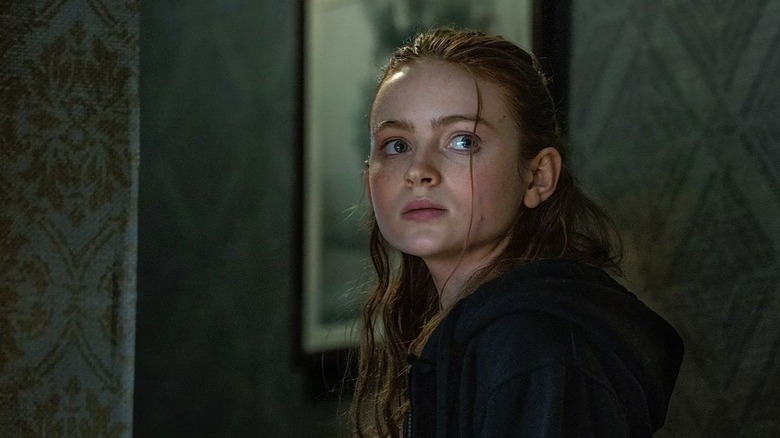
A few things remain sacred to Charlie as he slips into complete isolation and a fatal health crisis. One is Ellie, whom he hasn't seen in years before the events of the film. He remains connected to her through this essay. He is particularly fixated on a line where she says that "Moby Dick" allowed her to "think about my own life." This follows her analysis that Ahab thinks killing the whale will make his life better, but the whale is completely emotionless. This suggests that Ellie views her father as her own kind of whale — not because of his size, but because of his estrangement. She thinks that he is the cause of all the pain in her life and that he doesn't care about her at all, having not heard from him in years.
Charlie makes strides in repairing his relationship with Ellie over the course of the film, but he is scared of re-entering her life after his family fell apart when he left his wife for one of his male students. This love, which once offered solace, quickly became its own source of tragedy for Charlie when severe depression and emotional turmoil led his partner into life-threatening anorexia and suicide. Charlie avoids memories of his late partner, even the happy ones, and keeps them hidden away in a locked room or tucked into a bookshelf. But he does allow himself to ruminate on a happy memory of his family. Even though he is kept at bay by his affair, a custody battle, and eventually his weight gain, he knows they are out there living their lives still and thus allows himself to preserve a happy memory of them at the beach.
What happens at the end of The Whale?

At the end of "The Whale," Charlie makes a triumphant march to his daughter as she reads to him from the essay that he loves so much. Despite being on his deathbed (or perhaps death couch is more accurate), he manages to achieve a physical feat that he was unable to do days earlier. He rips off the tubes that aid his breathing, pushes himself to his feet, and trudges towards Ellie as she reads out the words he knows by heart. Just as he reaches her in the doorway, he ascends. His feet fly off the ground, his eyes turn to the heavens, and he is transported back to that peaceful day at the beach. In this memory, he is down to a healthier weight again. His feet are in the ocean, his young daughter plays in the sand, and his ex-wife Mary (Samantha Morton) haunts the edge of the frame like a specter, watching on.
So what exactly does this mean? Where is Charlie going? And did he actually get up and walk towards Ellie at all? The answer might seem cut and dry, but there are actually a few competing theories.
Did Charlie die in the end?
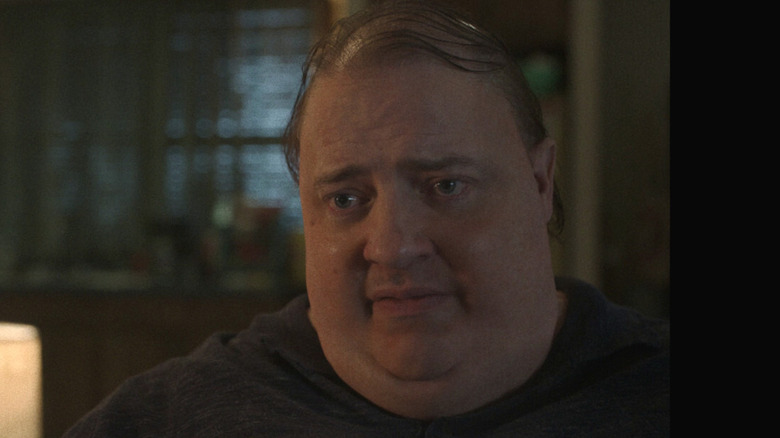
The most obvious conclusion to draw from this ending is that Charlie has perished from the congestive heart failure that is slowly killing him over the course of the film. The movie catalogs his final days, beginning on a Monday when his dear friend and nurse, Liz (Hong Chau), says he will be dead by the weekend. Although we don't see Charlie's dead body or his funeral, we know he is on the brink of death and that the strain he puts on his body by walking towards his daughter will likely cause his heart to finally fail. However, the ending is slightly ambiguous.
Part of the reason why Charlie's death is questionable is because it's unclear whether he wants to die or not. There are moments where he indulges dangerously in junk food and others where he stops himself, at least momentarily. His commitment to over-eating and reluctance to seek medical attention suggests that he is suicidal, but certain things hint at an optimism or will to live. He puts out apples for a bird that comes to his windowsill every day, something Ellie notices right away. Charlie also makes a last-ditch effort to reconnect with his daughter, and in getting to know her, finds a newfound love of humanity in general, declaring that, "People are amazing!" It almost seems too cruel that this reconnection with Ellie and subsequent optimism would come too late — when his body was too far gone to be saved — and that he would die anyway. So maybe that's not what happened.
Does Charlie go to heaven?
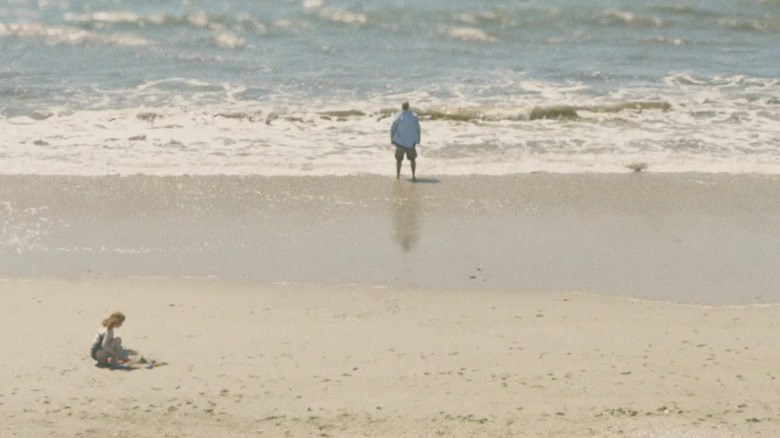
In Charlie's final moment, he retreats again to a memory of himself and his family on the beach. This memory, which Charlie references in conversation with his ex-wife in a previous scene, was a true moment of peace and clarity of spirit for him — perhaps the last he ever felt. So, is this heaven? The answer might guide the viewer as to whether or not Charlie died or not.
It's interesting that Charlie would end up in some version of heaven because of his complicated relationship with religion. Thomas (Ty Simpkins), a missionary from a local New Life church is a frequent guest at Charlie's house in the week leading up to his death. Charlie's late boyfriend Alan was the son of the head of the church and a devout follower. When his father found out about Alan's relationship with Charlie, he exiled him from the church, which is what sent Alan into a depressive episode that eventually led to his death. Charlie was at odds with Alan's faith when he was alive and remains at odds with it after his passing. This religion vehemently rejects homosexuality and insists that a sinner like Alan or Charlie would never get to heaven. The missionary encourages Charlie to deny his sexuality and bodily sins and ask for God's forgiveness so that he might gain salvation in the afterlife, but he refuses. How ironic would it be if Charlie ended up in a blissful eternity anyway?
The religious themes of the movie suggest that Charlie did in fact die and go to heaven in the end, but they may have just alluded to a kind of spiritual peace or death of ego that does not necessarily imply a physical death.
What has the cast and crew of The Whale said about the ending?

Brendan Fraser, who plays Charlie in "The Whale," has a theory about the film's ending that might surprise you. He described the ending to Entertainment Weekly and, in doing so, revealed that he does not think his character perishes in the final moments of the film:
"[I]t's a Herculean effort that he makes to even get to his feet. For him to finally break through to [Ellie], humble himself before her, and let her know that he made a mistake and is sorry for it. While his life has not physically ended in that moment, I think that he knows he doesn't need to live any longer, which is why he takes off his breather, he's got her reading the essay, and he does take to his feet like three Olympic dead-lifters, takes his baby steps to his baby, and in that beautiful two-shot, a great white light appears, and they look skyward. Depending on your belief system, spiritually or otherwise, we see that Charlie — with a touch of magic realism — finally does fly."
The white light and skyward look, along with the state of Charlie's health, definitely suggest that this is the moment his life "physically" ends, despite Fraser's interpretation. However, Charlie's march toward his daughter could be interpreted as a purely symbolic moment in itself.
"I think it's an apotheosis — you can take it how you want it," added playwright Samuel D. Hunter, who also adapted the work for the screen. "In the play, the way I wrote it is that you hear a sound of waves and they slowly intensify through that scene, so, there's a way to read it both ways. It wants to be miraculous, either literally or figuratively, and I think you can watch it either way."
The play had a surprising alternate ending
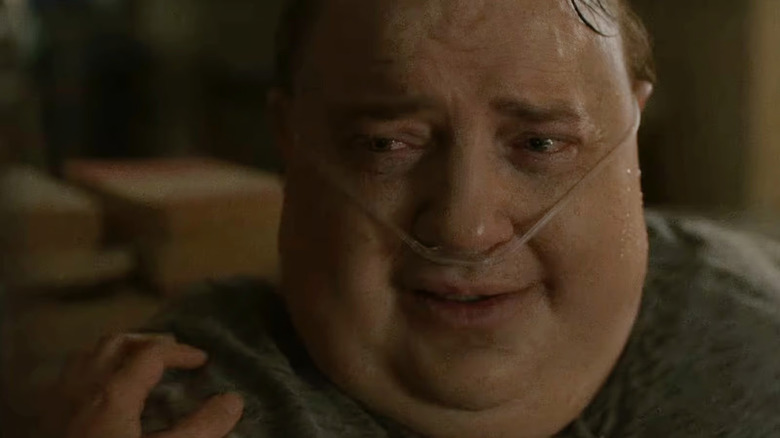
As it turns out, the choice to end the film with Charlie standing on the beach was entirely the idea of director Darren Aronofsky. The production of the play makes reference to Charlie's aforementioned memory through the sound of waves, but it ends abruptly, mid-sentence, with Charlie making his way to Ellie. Hunter gave his candid thoughts on Aronofsky's take on the ending in an interview with Digital Spy :
"The way the play ends is, Ellie has the last line of the essay: 'It made me feel glad for my ...' And she's cut off by the stage direction — 'a sharp intake of breath'. 'Charlie looks up, and has a sharp intake of breath. End of play.' I actually didn't know about the beach scenes until I saw a rough cut. It was just kind of an incredible surprise. I had no idea until I saw the rough cut, and I was so intensely moved by it. I was just like, 'Oh my God, that's perfect.' [...] In the play, it's the one moment that I script as he's giving that monologue about the Oregon coast that the sound of waves comes in. In the play, it's heightened, and expands a little bit. I think Darren [Aronofsky] took that idea, and kind of ran with it, in this gorgeous way."
Even though the movie ends in a slightly less ambiguous place than the stageplay, there is clearly still room for interpretation. Just like in the original piece from which it is adapted, the film dissolves its realism in this final scene and moves to a place of symbolism or magical realism. No matter how you interpret the ending of "The Whale," it certainly feels like a conclusive end to Charlie's story.
"The Whale" is currently available to stream on Showtime through Paramount Plus, and for rent on all the major streaming platforms.
‘The Whale’ ending explained: what happened to Charlie?
Spoilers ahead

Brendan Fraser has swept awards season with his critically acclaimed performance in The Whale , which has a particularly emotional climax.
Directed by Darren Aronofsky, the film follows morbidly obese literature teacher Charlie (Fraser) as he attempts to reconnect with his estranged daughter Ellie (Sadie Sink), who is torn up after Charlie left her and her mother to start a relationship with a man years earlier.
- READ MORE: Brendan Fraser: “I can’t get rid of the feeling that I’m a fraud”
Alongside Fraser and Sink, the film stars Hong Chau as Charlie’s best friend and nurse Liz, Ty Simpkins as Christian missionary Thomas and Samantha Morton as Ellie’s mother Mary.
What happens at the end of The Whale ?

As Charlie nears death in his home, Ellie confronts him after receiving a low grade for an essay he’d rewritten. Charlie explains that he replaced her rewritten essay with the Moby Dick essay Ellie had previously written when she was in eighth grade – deeming it the most honest piece of writing he’d ever read.
Charlie asks Ellie to read the Moby Dick essay to him one last time. She initially refuses and goes to leave, but stops at the door in tears and proceeds to read it. As she reads, Charlie stands up and attempts to walk towards her, which he had failed to do when Ellie first visited.
As Ellie completes the reading, Charlie starts to ascend to the heavens as he looks up towards a white light in the sky.
Recommended
Speaking to Entertainment Weekly , Fraser gave his interpretation on the ending. “It’s important because it’s a Herculean effort that he makes to even get to his feet. For him to finally break through to her, humble himself before her, and let her know that he made a mistake and is sorry for it.
“While his life has not physically ended in that moment, I think that he knows he doesn’t need to live any longer, which is why he takes off his breather, he’s got her reading the essay, and he does take to his feet like three Olympic dead-lifters, takes his baby steps to his baby, and in that beautiful two-shot, a great white light appears, and they look skyward. Depending on your belief system, spiritually or otherwise, we see that Charlie – with a touch of magic realism – finally does fly.”
- Related Topics
- Brendan Fraser
You May Also Like
‘alien: romulus’ review: chest-bursting reboot is as thrilling and scary as the original, tinashe – ‘quantum baby’ review: a fun stepping stone, le sserafim: the girl group redefining fearlessness, frankie beetlestone: “my perspective on the world had to come out of being in a dark place”, the ‘star wars: outlaws’ soundtrack is not just another john williams retread, more stories, film fans list the best movie biopics of all time, bebe rexha says she was banned from boarding flight in “hate crime”, watch st. vincent sing the national anthem and demonstrate basketball skills at la sparks game, new found glory, bowling for soup, plain white t’s and more for official disney pop punk covers album, who is jasveen sangha – the ‘ketamine queen’ accused of supplying matthew perry, the pains of being pure at heart reunite for 2025 european tour.
- Documentary
- Trailer Breakdown
- DMT News APP
- Privacy Policy
- Family Drama
- Social Drama
‘The Whale’ Ending, Explained: Why Was Charlie Hopeful About Ellie? Was he Able To Reconcile With Her?

Adapted from Samuel D. Hunter’s play, “The Whale” is the story of an English teacher who is suffering from an eating disorder and other unresolved issues in his life. He isn’t able to embrace his past and is on a journey of self-destruction where he has lost the will to live entirely. He has nothing left to look forward to in his life, and he was never able to cope with the loss of a loved one. In Darren Aronofsky’s film, the most uncomfortable scenes are the ones where Charlie, the protagonist, played by the brilliant Brendan Frazer, loses his control and eats everything in sight. Food can actually be looked at as the personification of evil, and Charlie’s dying willpower is the catalyst that makes sure he falls prey to that. So, let’s see where Charlie’s life takes him and if he is able to get his salvation at the end of the film “The Whale.”
Major Spoilers Ahead
‘The Whale’ Plot Summary: What Is The Film About?
In the first few minutes of the film, “The Whale,” we get to know that Charlie is fully aware of his miserable existence, and that is why he doesn’t like people seeing him in person. Charlie taught online writing courses at a university, and he never opened his camera and always told his students that there was some issue with his laptop. It is at this point that you realize Charlie has some serious, unresolved issues that are eating him up from within. Charlie had a compulsive eating disorder, and things had gotten so bad that he was told he could die any moment from congestive heart failure. The imagery of him eating compulsively, his difficulty in dealing with his disorder, his panic attacks, him profusely sweating, groaning and writhing in pain, is created in a manner that makes you feel uncomfortable and grotesque at the same time.
When we first saw him on camera, he was watching an adult film, and a missionary named Thomas walked in upon him. It felt like Charlie was about to die because he was suddenly experiencing a lot of pain in his chest, and Thomas began panicking upon seeing him because he didn’t know what to do. It was a very chaotic situation where Thomas got scandalized by seeing that he was watching explicit content, which for him was probably a sin, and then he didn’t know what to do because Charlie told him not to call an ambulance. Thomas found it absurd when he asked him to read an essay that some student had written analyzing the novel by Herman Melville, Moby-Dick.
We saw that as soon as Thomas started reading the lines of the analysis, which was undeniably quite bluntly written by an anonymous student, Charlie’s pain started to wither away. Those words worked like a magic spell, and Charlie could finally breathe and calm down. He asked Thomas to wait until his nurse came because he believed that he was going to die any moment. Thomas said that he was from New Life, a kind of Christian fellowship and that he wanted to help Charlie follow a spiritual path. Thomas felt that his arrival at the moment was a signal from God, and he felt obligated to cure Charlie. But Charlie was not interested in any of those things. He had read every pamphlet that New Life had ever printed, but it never had an impact on him. It was not like he was against the church, but there were some things that he could never understand in the way that people like Thomas did.
Charlie couldn’t walk or move properly, and he mostly stayed on the couch. His days were mundane, and apart from reading the essays of his students, he didn’t have any exciting activities to look forward to. What gave him the utmost gratification was a piece of writing that was blunt and honest. He always told his students that instead of being objective, they should be honest. As a teacher, he employed unorthodox methods, and he didn’t mind even if they blatantly criticized the classics. He was open to different perspectives and opinions, and he made his students believe that what they thought didn’t need to resonate with the rest of the world.
When Liz, Charlie’s friend, and nurse, arrived at his house, she did a routine checkup and realized that his condition was worsening day by day. His blood pressure was quite high, and she diagnosed that if he kept on going like that, he would not live much longer. Liz hated missionaries who came from New Life, and she asked Thomas why he would waste his life by working for them when he could actually go out there and make a difference. Liz told Thomas that he mustn’t come there ever again, as they didn’t want to hear what his God had to say. Liz told Thomas that New Life was the reason that Charlie lost the love of his life, though she didn’t divulge any more information, and it made Thomas very curious as to what role the church played in the death of a man. Liz was sick and tired of telling Charlie that he needed to go to the hospital, but he always told her that he didn’t have enough money to pay the hospital bills or even buy insurance. Liz had also given up after a point and she realized that Charlie probably didn’t want to live any longer. She tried to do as much as she could, but she didn’t have any delusions about what the end result was going to be.
What Had Happened To Charlie’s Lover?
Throughout the film, The Whale, we see that Thomas keeps coming back again and again because he thinks that he can help Charlie’s cause. One day Liz came from her work and once again found him in Charlie’s house. She got frustrated by his presence, as he didn’t understand what Charlie was going through and had no knowledge of what had happened to him in his life. She wanted him to stop being a savior because, in reality, he couldn’t do much for Charlie. Liz took him outside and told him that Charlie didn’t need this kind of unnecessary interference in his life, as he always had a lot to deal with. Thomas firmly said that he disagreed with Liz’s opinions, and that’s when she told him about what had happened with Alan, Charlie’s lover, and how New Life was indirectly responsible for his death. She revealed to Thomas that Alan was not only Charlie’s lover but also her brother.
Alan was also associated with New Life and had gone to South America to spread the word of God. Alan was not happy with his life, and he wanted to come back and start afresh, but he couldn’t do that because of his father. His father had found a girl for him at the church, but Alan didn’t want to marry her because he barely knew her. He was scared that the moment he came back to Iowa, his father would get him married to the girl, and he wouldn’t have a say in the matter. When Alan finally mustered the courage to return, he fell in love with Charlie, and obviously, being in a homosexual relationship had consequences, which his father considered nothing short of blasphemy.
Alan was kicked out of his family, and his father never accepted him throughout his life. Alan could never get over that, and he finally died because of the impact his father’s words and actions had on him mentally. Liz’s father told the congregation that Alan’s death was an unfortunate accident, but she knew it was more than that. She always blamed her father and his intolerant and obsolete religious beliefs for losing her brother. She told Thomas that the teachings he was propagating were hollow from within and didn’t hold any relevance for people like her and Charlie. She told him to go away and never come back to Charlie’s house again.
‘The Whale’ Ending Explained: Why Was Charlie Hopeful About Ellie? Was he Able To Reconcile With Her?
Ellie was probably the rudest and most misbehaving teenager one could imagine, and seeing her, one could tell she had serious issues that needed to be addressed as soon as possible. Charlie had a habit of exuding the utmost positivity even in the direst of circumstances, and it’s likely that he saw a silver lining in Ellie’s behavior as well, despite the fact that she portrayed the most abhorrent side of herself in front of him. She told him to write his essays after she learned that he taught the same thing at his university. Charlie had not met Ellie since his wife, Mary, had vociferously fought for full custody after their divorce. Charlie kept sending her child support and whatever other funds she needed, as he wanted Ellie to be brought up in the best possible manner. Ellie called Charlie disgusting, and it was not because of the way he looked but because he had abandoned her when she was eight, and it had ruined her from within. Not having a father around had a deep psychological impact on her, and she became this evil being who got gratified by making others subject to misery.
Ellie decided that there was no point in wasting time over things that couldn’t be changed now, so she started leaving, and that’s when we came to know about another secret of Charlie’s life. Charlie almost begged his daughter to stay and told her that in return he would give her a whopping sum. Till that moment, we believed that Charlie didn’t have money to pay for his insurance, but the reality was that he didn’t want to spend a penny on himself because he wanted to secure his daughter’s future. Ellie agreed to stay on the condition that Charlie does her essays because she apparently despised writing.
Mary came to know that her daughter was visiting her father, and she understood that he must have offered money to make her stay. She had this conversation in front of Liz, who had previously assumed that Charlie did not have that kind of money. Liz felt betrayed, but Charlie tried to make her understand why it was so important for him to do so. It was surprising that even after Ellie was extremely rude and unsympathetic towards Charlie, he believed that she was a good human being. Contrary to his perspective, Mary believed that her daughter was pure evil, and she never told Charlie anything about her horrendous behavior because she thought that would reflect badly on her and that people would call her a bad mother. She told Charlie the kind of things she had done and how she had posted a picture of him on social media, making fun of his obesity. But even then, Charlie didn’t like a word his wife said and stuck to his opinion that it was only the circumstances that had made her into a devil, though deep down, she was a good human being who wanted to help others.
Toward the end of the film “The Whale,” we see that Charlie finds proof of his daughter’s good nature when he accidentally comes to know that she has helped Thomas reconnect with her parents. Thomas wasn’t part of New Life, and he had run away from his home after stealing money from the church. He thought that his family wouldn’t accept him back, but Ellie had sent his pictures and a voice recording, in which he confessed his crimes, to his family without telling him.
Charlie accepted that he hadn’t done anything right in his life, and for the same reason, his conscience was burdened with guilt, so much so that he had lost the will to live. He always told Liz that he wanted to do one right thing before he died. He wanted his daughter to know that she was not a bad human being but a victim of the circumstances. He wanted her to know that there was good in her and that she only needed to change her attitude. We now know that Ellie wrote the analysis on Moby Dick that Charlie kept reading time and again when he was in pain. Charlie believed it to be the best piece of writing because it was the truth, and Ellie hadn’t shied away by sugarcoating her words.
When Ellie asked Charlie to write the essays for her, he gave her the same essay that she had written on Moby Dick. Ellie, without reading it, had submitted her assignment, and when she failed her examination, she came to confront Charlie, and that’s when she learned about it. Ellie had written in her analysis how, throughout the story, the author was just trying to save his audience from his own sad story. Mary had sent the essay to Charlie about four years ago, and since then, he had become obsessed with it. That day, Ellie called Charlie “daddy” for the first time, and it became a cathartic moment for the duo. Charlie got up from the couch without any support, and he started moving towards Ellie while she kept reading the extract from her analysis. While Charlie walked his last steps, all the fond memories kept coming back to him. In those last moments, Ellie had nothing but love for her father. She let bygones be bygones, and it felt like somebody had lifted a huge burden from her shoulders. Charlie’s miserable life came to an end, but before going, he made sure that Ellie knew that she was not a bad human being.
Final Words
“The Whale” is not the kind of film that you can watch time and again, and at times, you do not realize what exactly was the intention of the writers behind a particular scene or character. The film is highly predictable, and there is no plot point that you don’t see coming, probably because Darren Aronofsky paid more attention to creating an imagery that breaks stereotypes and prejudices than to creating an authentic storyline that has something new to offer the audience. Yes, we learn about a person’s plight who has a compulsive eating disorder, but that isn’t always enough to affect us. What holds you for the entire film is the earnest and spellbinding performances of Brendan Fraser as Charlie and Sadie Sink as Ellie. You can watch the film for the performances or if you want to know how an eating disorder can wreak havoc in the life of a person and completely destroy him physically and emotionally.

‘Manorathangal’ Episode 2 “Kadugannava” Recap And Ending Explained
‘dance first’ movie ending explained & summary: did samuel beckett serve in world war ii, ‘manorathangal’ episode 7 “kadalkkaattu” recap and ending explained, ‘gunner’ movie ending explained & summary: is dobbs dead or alive, more like this, ‘the duel’ 2024 ending explained & film summary: are colin and woody dead, ‘crescent city’ movie ending explained and summary: who was the serial killer.
- Write For DMT
COPYRIGHT © DMT. All rights Reserved. All Images property of their respective owners.
We earn a commission for products purchased through some links in this article.

The Whale may end in a seemingly confusing way, but it's not
It's not that obtuse, really.

The film, surprisingly to some, missed out on Best Picture and Best Adapted Screenplay; The Whale 's source material is a 2012 play of the same name. The accolades it has garnered already, however, have piqued people's interests.
The movie itself isn't particularly oblique, nor is the ending that ambiguous despite its artistic license. As we delve into how it ends, be forewarned: spoilers for The Whale follow .
The Whale centres on a man named Charlie (Fraser), an obese man who works as an English Literature professor, teaching courses online. He always has his video camera off, leading some to speculate in the chat section about his personal life.

Charlie is reticent to interact with strangers, and he is visited most often by his friend Liz (Chau), a nurse who is very concerned about Charlie's health. Liz's concern is two-fold, for she is the sister of Charlie's partner Alan, who died by suicide.
We see Charlie's life unfold: he orders takeaway pizza but never interacts with the delivery-person, only shouting through the door to him and leaving money in the mailbox. He also has an estranged daughter, Ellie ( Stranger Things ' Sadie Sink ) whose rebellious nature and indifference to school causes tension between her and her mother, Charlie's ex-wife Mary ( The Walking Dead 's Samantha Morton).
Ellie agrees that she'll spend time with her father if he agrees to write her school assignments for her, but she struggles to contain her anger. Meanwhile, a young man named Thomas shows up to preach to Charlie about the New Life church; Charlie entertains him and the two strike up a strange bond.
Liz, however, is not pleased by Thomas' visits and dissuades him from returning by revealing that she and Alan were adopted by the Church leader, and it was Alan's inability to reconcile his sexuality with his faith that contributed to his death. Thomas, however, returns and finds Ellie instead and they begin a tense but curious friendship.

During one of her visits, Ellie drugs Charlie and while he's asleep Thomas arrives, and the two bond over a joint. Thomas reveals he ran away from home after stealing money from his youth group; Ellie secretly records the confession.
Later, Liz visits while Ellie is there and Charlie reveals that he has plenty of money saved, and he promised it all to Ellie if she'd just keep visiting. Liz is distraught, both at Charlie's unwillingness to help himself but also at his reticence to help her, and she leaves but not before Mary arrives to chastise him for bending to Ellie's will.
Mary reveals that Ellie has been surreptitiously taking photos of Charlie and putting them on Facebook, but Charlie doesn't care, finally admitting the crux of his motivations: he needs to know that he did one thing right with his life. Mary leaves, and Thomas arrives to reveal that he's going home; Ellie sent his confession to his youth group, but they accepted his apology.
He tries one last time to convert Charlie, but Charlie dismisses him angrily when he insists Alan died because of his sexuality and turning his back on God. Still emotional, Charlie sends a profanity-laden email to his students to write something honest and when they do, he reciprocates by turning on his camera.

Instead of being welcoming, his students are repulsed, leading him to throw his laptop against the fridge. Liz returns and reconciles with Charlie, spending time with him as he nears his seemingly inevitable death.
Ellie, too, returns just as Charlie faces his final hours, to rebuke him for changing the essay he promised he'd write for her. Charlie reveals he used the essay Ellie wrote when she was eight about Moby-Dick .
It becomes clear that Charlie is dying, and he begs Ellie to read the essay, which she does. As she reads, he stands and walks towards her (which he was unable to do during their first visit). As he nears her, a white light begins to engulf them and Charlie is lifted into the air until the light takes over completely; the final shot is the a younger Charlie on the beach with Ellie as a little girl, a memory.
The message is clear: Charlie has died. Whether he is in the afterlife, or reliving his favourite memory before his death, or whether this is simply a moment from the past for the audience's eyes — that's up to you.
The Whale is out now in cinemas.
Best Entertainment and Tech Deals

Shop Sky deals across TV, broadband and mobile

Shop Google Pixel 7a phones

Coronation Street X Joanie - Gilroy Retro Newton And Ridley Sweatshirt

LEGO Disney and Pixar ‘Up’ House

LEGO 007 Aston Martin DB5 James Bond
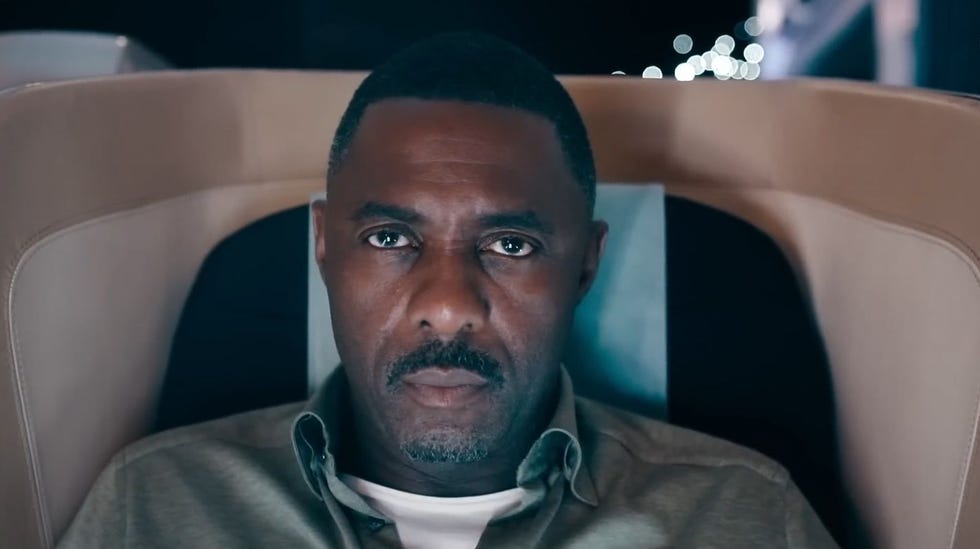
Sign up for Apple TV+
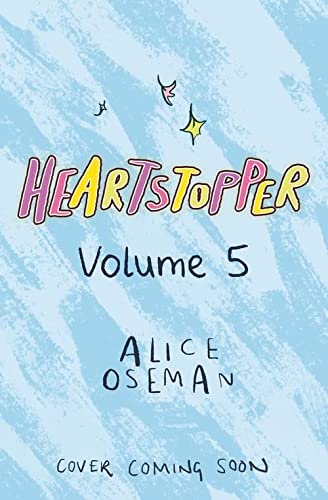
Heartstopper Volume 5

Barbie The Movie doll

Sign up for Disney+
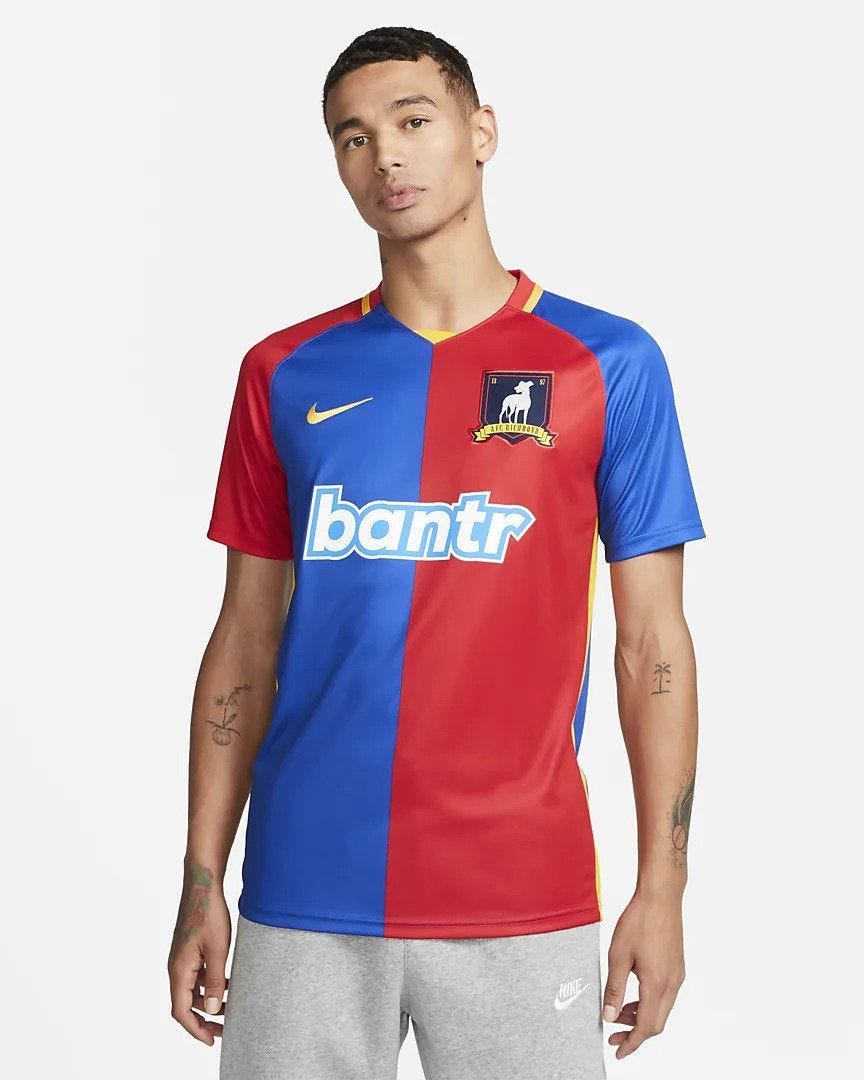
Ted Lasso x Nike: AFC Richmond home kit

The Woman in Me by Britney Spears

Jojo: Finally Home by Johannes Radebe

The Witcher wolf pendant

Barbenheimer - Barbie v Oppenheimer T-shirt

Barbenheimer T-shirt

Best PS5 deals - where to buy PS5 today?

Anker PowerCore Essential 20,000 PD Power Bank
Gabriella Geisinger is a freelance journalist and film critic, and was previously Deputy Movies Editor at Digital Spy. She loves Star Wars , coming-of-age stories, thrillers , and true crime. A born and raised New Yorker, she also loves coffee and the colour black, obviously.
.css-15yqwdi:before{top:0;width:100%;height:0.25rem;content:'';position:absolute;background-image:linear-gradient(to right,#51B3E0,#51B3E0 2.5rem,#E5ADAE 2.5rem,#E5ADAE 5rem,#E5E54F 5rem,#E5E54F 7.5rem,black 7.5rem,black);} Digital Spy Features

Corrie's Dee-Dee confronts Joel in 23 pictures

Hollyoaks' Frankie confronts Suzanne in 26 pics

Home and Away kidnap ordeal for Dana in 37 pics

Alien: Romulus has terrible fan service

Does Alien: Romulus have a post0credit scene?

Why Deadpool & Wolverine has been a box-office hit

Alien: Romulus ending explained

Best movies on Prime Video to watch right now

The 29 best movies of 2024 (so far)
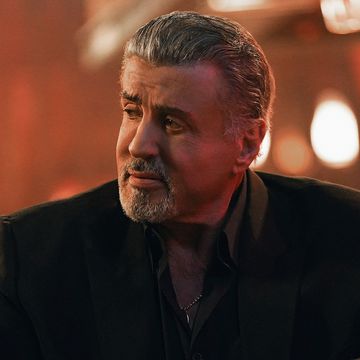
Tulsa King season 2's release date is confirmed

It Ends With Us ending makes a smart change
Movie Reviews
Tv/streaming, collections, chaz's journal, great movies, contributors.

Now streaming on:
"The Whale" is an abhorrent film, but it also features excellent performances.
It gawks at the grotesquerie of its central figure beneath the guise of sentimentality, but it also offers sharp exchanges between its characters that ring with bracing honesty.
It's the kind of film you should probably see if only to have an informed, thoughtful discussion about it, but it's also one you probably won't want to watch.
This aligns it with Darren Aronofsky's movies in general, which can often be a challenging sit. The director is notorious for putting his actors (and his audiences) through the wringer, whether it's Jennifer Connolly's drug addict in " Requiem for a Dream ," Mickey Rourke's aging athlete in " The Wrestler ," Natalie Portman's obsessed ballerina in " Black Swan ," or Jennifer Lawrence's besieged wife in "mother!" (For the record, I'm a fan of Aronofsky's work in general.)
But the difference between those films and "The Whale" is their intent, whether it's the splendor of their artistry or the thrill of their provocation. There's a verve to those movies, an unpredictability, an undeniable daring, and a virtuoso style. They feature images you've likely never seen before or since, but they'll undoubtedly stay with you afterward.
"The Whale" may initially feel gentler, but its main point seems to be sticking the camera in front of Brendan Fraser , encased in a fat suit that makes him appear to weigh 600 pounds, and asking us to wallow in his deterioration. In theory, we are meant to pity him or at least find sympathy for his physical and psychological plight by the film's conclusion. But in reality, the overall vibe is one of morbid fascination for this mountain of a man. Here he is, knocking over an end table as he struggles to get up from the couch; there he is, cramming candy bars in his mouth as he Googles "congestive heart failure." We can tsk-tsk all we like between our mouthfuls of popcorn and Junior Mints while watching Fraser's Charlie gobble greasy fried chicken straight from the bucket or inhale a giant meatball sub with such alacrity that he nearly chokes to death. The message "The Whale" sends us home with seems to be: Thank God that's not us.
In working from Samuel D. Hunter's script, based on Hunter's stage play, Aronofsky doesn't appear to be as interested in understanding these impulses and indulgences as much as pointing and staring at them. His depiction of Charlie's isolation within his squalid Idaho apartment includes a scene of him masturbating to gay porn with such gusto that he almost has a heart attack, a moment made of equal parts shock value and shame. But then, in a jarring shift, the tone eventually turns maudlin with Charlie's increasing martyrdom.
Within the extremes of this approach, Fraser brings more warmth and humanity to the role than he's afforded on the page. We hear his voice first; Charlie is a college writing professor who teaches his students online from behind the safety of a black square. And it's such a welcoming and resonant sound, full of decency and humor. Fraser's been away for a while, but his contradictions have always made him an engaging screen presence—the contrast of his imposing physique and playful spirit. He does so much with his eyes here to give us a glimpse into Charlie's sweet but tortured soul, and the subtlety he's able to convey goes a long way toward making "The Whale" tolerable.
But he's also saddled with a screenplay that spells out every emotion in ways that are so clunky as to be groan-inducing. At Charlie's most desperate, panicky moments, he soothes himself by reading or reciting a student's beloved essay on Moby Dick , which—in part—gives the film its title and will take on increasing significance. He describes the elusive white whale of Herman Melville's novel as he stands up, shirtless, and lumbers across the living room, down the hall, and toward the bedroom with a walker. At this moment, you're meant to marvel at the elaborate makeup and prosthetic work on display; you're more likely to roll your eyes at the writing.
"He thinks his life will be better if he can just kill this whale, but in reality, it won't help him at all," he intones in a painfully obvious bit of symbolism. "This book made me think about my own life," he adds as if we couldn't figure that out for ourselves.
A few visitors interrupt the loneliness of his days, chiefly Hong Chau as his nurse and longtime friend, Liz. She's deeply caring but also no-nonsense, providing a crucial spark to these otherwise dour proceedings. Aronofsky's longtime cinematographer, the brilliant Matthew Libatique , has lit Charlie's apartment in such a relentlessly dark and dim fashion to signify his sorrow that it's oppressive. Once you realize the entirety of the film will take place within these cramped confines, it sends a shiver of dread. And the choice to tell this story in the boxy, 1.33 aspect ratio further heightens its sense of dour claustrophobia.
But then "Stranger Things" star Sadie Sink arrives as Charlie's rebellious, estranged daughter, Ellie; her mom was married to Charlie before he came out as a gay man. While their first meeting in many years is laden with exposition about the pain and awkwardness of their time apart, the two eventually settle into an interesting, prickly rapport. Sink brings immediacy and accessibility to the role of the sullen but bright teenager, and her presence, like Chau's, improves "The Whale" considerably. Her casting is also spot-on in her resemblance to Fraser, especially in her expressive eyes.
The arrival of yet another visitor—an earnest, insistent church missionary played by Ty Simpkins —feels like a total contrivance, however. Allowing him inside the apartment repeatedly makes zero sense, even within the context that Charlie believes he's dying and wants to make amends. He even says to this sweet young man: "I'm not interested in being saved." And yet, the exchanges between Sink and Simpkins provide some much-needed life and emotional truth. The subplot about their unlikely friendship feels like something from a totally different movie and a much more interesting one.
Instead, Aronofsky insists on veering between cruelty and melodrama, with Fraser stuck in the middle, a curiosity on display.
Now playing in theaters.

Christy Lemire
Christy Lemire is a longtime film critic who has written for RogerEbert.com since 2013. Before that, she was the film critic for The Associated Press for nearly 15 years and co-hosted the public television series "Ebert Presents At the Movies" opposite Ignatiy Vishnevetsky, with Roger Ebert serving as managing editor. Read her answers to our Movie Love Questionnaire here .
Now playing

Caligula: The Ultimate Cut
Peter sobczynski.

Dance First
Glenn kenny.

Robert Daniels

Peyton Robinson

Tomris Laffly

Sorry/Not Sorry
Matt zoller seitz, film credits.

The Whale (2022)
Rated R for language, some drug use and sexual content.
117 minutes
Brendan Fraser as Charlie
Sadie Sink as Ellie
Hong Chau as Liz
Ty Simpkins as Thomas
Samantha Morton as Mary
Sathya Sridharan as Dan
- Darren Aronofsky
Writer (based on the play by)
- Samuel D. Hunter
Cinematographer
- Matthew Libatique
- Andrew Weisblum
- Rob Simonsen
Latest blog posts

A Woman Without Peers: Gena Rowlands (1930-2024)

The Needle Drop Sessions: Pump Up the Volume & Untamed Heart

Locarno Film Festival 2024: Youth (Hard Times), Transamazonia, Moon

Thumbnails 8/15/24: Six Must-Reads You Don’t Want To Miss This Week
Get the Reddit app
The goal of /r/Movies is to provide an inclusive place for discussions and news about films with major releases. Submissions should be for the purpose of informing or initiating a discussion, not just to entertain readers. Read our extensive list of rules for more information on other types of posts like fan-art and self-promotion, or message the moderators if you have any questions.
Official Discussion - The Whale [SPOILERS]
If you've seen the film, please rate it at this poll
If you haven't seen the film but would like to see the result of the poll click here
Click here to see the rankings of 2022 films
Click here to see the rankings for every poll done
A reclusive English teacher attempts to reconnect with his estranged teenage daughter.
Darren Aronofsky
Samuel D. Hunter
Brendan Fraser as Charlie
Sadie Sink as Ellie
Ty Simpkins as Thomas
Hong Chau as Liz
Samantha Morton as Mary
Sathya Sridharan as Dan the Pizza Man
-- Rotten Tomatoes: 66%
Metacritic: 62
VOD: Theaters
By continuing, you agree to our User Agreement and acknowledge that you understand the Privacy Policy .
Enter the 6-digit code from your authenticator app
You’ve set up two-factor authentication for this account.
Enter a 6-digit backup code
Create your username and password.
Reddit is anonymous, so your username is what you’ll go by here. Choose wisely—because once you get a name, you can’t change it.
Reset your password
Enter your email address or username and we’ll send you a link to reset your password
Check your inbox
An email with a link to reset your password was sent to the email address associated with your account
Choose a Reddit account to continue
- Login / Sign Up
Darren Aronofsky’s The Whale is an act of hate disguised as tough love
Brendan Fraser’s performance is legitimately award-worthy, but the film is an act of hate disguised as tough love
by Katie Rife

This review of The Whale was originally published following its premiere at the 2022 Toronto International Film Festival. It has been updated and reposted for the film’s theatrical release.
A24’s The Whale drops all of Darren Aronofsky’s worst tendencies into a fat suit. It’s an exercise in abjection in the mode of Aronofsky’s torturous Requiem for a Dream , but it’s focused on an even more vulnerable target than Requiem ’s addicts. It’s also full of the pet biblical wankery of Mother! , Noah , and The Fountain , but centered on a Christ figure whose masochistic superpower is to absorb the cruelty of everyone around him and store it safely inside his massive frame.
To be fair, some people enjoy this kind of miserabilism. But these viewers are also warned that not only is this film difficult to endure and likely to be actively harmful to some audiences, it’s also a self-serving reinforcement of the status quo — which is one of the most boring things a movie can be.
For a movie that, in the most generous reading possible, encourages viewers to consider that maybe there’s a painful backstory behind bodies they consider “disgusting” (the movie’s word), The Whale seems to have little interest in the point of view of its protagonist, Charlie (Brendan Fraser). Charlie is a middle-aged divorcé living in a small apartment somewhere in Idaho, where he teaches English composition classes online. Charlie never turns his camera on during lectures, because he’s fat — very fat, around 600 pounds. Charlie has trouble getting around without a walker, and he has adaptive devices like grabber sticks stashed around his house.
If an alien landed on Earth and wondered whether the human species found its largest members attractive or repellent, The Whale would clearly communicate the answer. Aronofsky turns up the foley audio whenever Charlie is eating, to emphasize the wet sound of lips smacking together. He plays ominous music under these sequences, so we know Charlie’s doing something very bad indeed . Fraser’s neck and upper lip are perpetually beaded with sweat, and his T-shirt is dirty and covered in crumbs. At one point, he takes off his shirt and slowly makes his way to his bed, sagging rolls of prosthetic fat dangling off his body as he slouches toward the camera like the rough beast he is. In case viewers still don’t get that they’re supposed to find him disgusting, he recites an essay about Moby-Dick and how a whale is “a poor big animal” with no feelings.
And that’s just what Aronofsky communicates about him through the film’s directing. The story in The Whale ’s first half is a gauntlet of humiliation, beginning as an evangelical missionary named Thomas (Ty Simpkins) walks in on Charlie as he’s having a heart attack, gay porn still playing on his laptop from a pathetic attempt at masturbation. Charlie’s nurse and only friend, Liz (Hong Chau), is mostly kind to him, although she enables him with meatball subs and buckets of fried chicken. So is Thomas, although he’s less interested in Charlie as a person than as a soul to save. But Charlie’s 17-year-old daughter Ellie (Sadie Sink) openly despises him, and says the most vicious things she can think of to punish Charlie for leaving her and her mom, Mary (Samantha Morton), when Ellie was 8.
Aronofsky and writer Samuel D. Hunter (adapting his own stage play) don’t reveal the condescending point of all of this until the second half of the movie: Charlie is a saint, a Christ figure, the fat man who so loved the world that he let people in his life treat him like complete dogshit in order to absolve them of their hatred, and him of his sins. Meanwhile, a subplot involving Thomas’ past life in Iowa makes the bizarre assertion that people are actually trying to help when they treat others unkindly, which can only be true if the target of that hostility doesn’t know what’s good for them. So which is it? Should a person turn the other cheek, or be cruel to be kind? Depends on whether they’re fat, it seems. Charlie never comments on other characters’ smoking and drinking, but they sure do comment on his weight.
Perhaps the most frustrating thing about The Whale is how close it comes to some sort of insight. Aronofsky and Hunter just needed to show some empathy and curiosity about people Charlie’s size, rather than paternalistically guessing at their motivations. The main culprit here is a plot point where Charlie refuses to go to the hospital, even though his blood pressure is dangerously high and he’s showing symptoms of congestive heart failure. At first, he lies to Liz and says he doesn’t have the money to pay the massive medical bills he’d rack up as an uninsured patient. Then it emerges that Charlie has more than $100,000 tucked away in savings.

The Whale understands this as a combination of selflessness — he’s hoping to give that money to Ellie after he dies — and suicidality. What gives away Aronofsky and Hunter’s projection about Charlie’s motivations is that extensive studies have shown why obese patients avoid medical treatment , and it has nothing to do with self-sacrificing messiah-complex bullshit. Doctors are just cruel to fat people — and disproportionately likely to dismiss, demean, and misdiagnose them.
The other frustrating thing is that Brendan Fraser is actually a significant asset in the title role. He plays Charlie as a smart, funny, thoughtful man who loves language and creativity, and refuses to let the tragic circumstances of his life turn him into a cynic. He sees the best in everyone, even Ellie, whose insults he counters with affirmations and support. (She’s hurting, you see.) Fraser’s eyes are kind, and his eyebrows are furrowed with sadness and worry.
But if there’s any rage behind those eyes, we don’t see it. If Charlie is just telling people what they want to hear in hopes of minimizing their abuse, that doesn’t translate. The film seems satisfied with his surface-level protestations that he’s fine and happy and just a naturally positive guy, which again betrays its lack of interest in Charlie’s inner emotional life — Fraser’s sensitive attempt to find a man inside the symbol notwithstanding.
Aronofsky and his team are more interested in their own cleverness. Some of the barbs thrown around in Charlie’s apartment are actually pretty funny. (The movie openly shows its theatrical roots: The entire story takes place within the confines of Charlie’s apartment and front porch.) Chau in particular brings a prickly warmth to her role as Liz, the type of friend whose love language is playful insults, and whose purpose in life is as a fierce defender. Liz is hurting, too, of course; everyone is here. But while everyone is hurting, Charlie has to suffer the most for it.
If you look at The Whale as a fable, its moral is that it’s the responsibility of the abused to love and forgive their abusers. The movie thinks it’s saying, “You don’t understand; he’s fat because he’s suffering.” But it ends up saying, “You don’t understand; we have to be cruel to fat people, because we are suffering.” Aronofsky and Hunter’s biblical metaphor aside, fat people didn’t volunteer to serve as repositories for society’s rage and contempt. No one agrees to be bullied so the bully can feel better about themselves — that’s a self-serving lie bullies tell themselves. This is an externally imposed martyrdom, which negates the point of the exercise.
In The Whale , Aronofsky posits his sadism as an intellectual experiment, challenging viewers to find the humanity buried under Charlie’s thick layers of fat. That’s not as benevolent of a premise as he seems to think it is. It proceeds from the assumption that a 600-pound man is inherently unlovable. It’s like walking up to a stranger on the street and saying, “You’re an abomination, but I love you anyway,” in keeping with the strong strain of self-satisfied Christianity that the film purports to critique. Audience members get to walk away proud of themselves that they shed a few tears for this disgusting whale, while gaining no new insight into what it’s actually like to be that whale. That’s not empathy. That’s pity, buried under a thick, smothering layer of contempt.
The Whale is now playing in theaters.
- Entertainment
Most Popular
- Twisters, Netflix’s The Union, and every movie new to streaming this week
- The best sci-fi movies to watch on Netflix this August
- Why did the ending of The Umbrella Academy suck so much?
- Wolverine’s live-action mask had to contend with VFX and the fandom
- SteamWorld Heist 2 is a multi-classing masterwork
Patch Notes
The best of Polygon in your inbox, every Friday.
This is the title for the native ad
More in Reviews

The Latest ⚡️
- Share full article
For more audio journalism and storytelling, download New York Times Audio , a new iOS app available for news subscribers.
Breaking’s Olympic Debut
A sport’s journey from the streets of new york all the way to the paris games..
This transcript was created using speech recognition software. While it has been reviewed by human transcribers, it may contain errors. Please review the episode audio before quoting from this transcript and email [email protected] with any questions.
From “The New York Times,” I’m Sabrina Tavernise. And this is “The Daily.”
So my name is Gabriel “Kwikstep” Dionisio.
Rokafella, R-O-K-A-F-E-L-L-A.
I go by Kid Glyde. I represent Dynamic Rockers. I’m from Queens, New York.
This year at the Olympic Games, there’s one sport that’s on stage for the first time — breakdancing.
I’m excited that people are going to be exposed to it on that kind of stage.
They’re going to see breaking. They’re going to see hip-hop. They’re going to feel it. They’re going to — you know what I’m saying? So it’s going to be an experience.
Today, my colleague, Jonathan Abrams, tells the story of how it went from the streets of New York all the way to the Paris games.
But I’m also concerned that it’s not being represented at its fullest cultural capacity.
People are clueless to what this even is. And people are going to be really surprised.
And the debate that journey has inspired about whether treating breakdancing as just another sport might be a mistake.
This comes from a culture that had to go through so much just to exist. So are you going to do right by us?
[MUSIC PLAYING]
It’s Friday, August 9. Jonathan, welcome to the show.
Thank you so much, Sabrina.
So, Jonathan, we’re going to talk today about the Olympics. And I think something that catches people’s attention is when the Olympics adds new sports. The Olympics is this ancient thing. So, I find that kind of surprising when new things pop up. And you’ve been writing specifically about the new event that is debuting this year in Paris, and that is breakdancing.
Yeah, a lot of people in the community refer to it as “breaking.” Breakdancing is kind of a term that they have said was created by mainstream media and not a term that they use. So it’s almost frowned upon.
Ah. OK, breaking. Got it.
So it’s been a little bit of a journey these last few years to get it to the Olympics. And this is such a special watershed moment. It’s kind of crazy to think that breakdancers are going to be at the Olympic Games. They’re going to be mixing along with LeBron James, with Kevin Durant, with Simone Biles, all these athletes you historically think of being involved and intertwined with the games. You’re going to have a component of hip-hop right there alongside with them.
And it’s joining a class of new sports recently added to the Olympics, like skateboarding and rock climbing and surfing. And if you look at these sports, what they all have in common is that they’re trying to get a younger audience to watch the games.
And what the International Olympic Committee — they’ve been frank about what they’re trying to do — is that they’re trying to go for that younger audience because viewership has been way, way down. And so these ancient games are trying to modernize themselves by changing the rules and welcoming these new events to have a newer, younger, more diverse viewership.
OK, so breakdancing — oh, sorry, breaking — is here to try to breathe some new life into the Olympic Games — expand the audience, as you say. But I don’t really think of breaking as a sport, I mean, never mind a competitive Olympic sport.
Lots of people make that argument, Sabrina, but competition has been part of breaking since its inception in the Bronx in the 1970s. At that time, New York City is basically in this state of disrepair. The construction of the Cross Bronx Expressway cuts through the heart of the South Bronx, and it displaces thousands of residents. Crime levels rise, unemployment increases. These large buildings are sitting vacant because of white flight. And property owners, some are facing default, and they start burning their buildings in order to cash in on the insurance value. And people, especially the Black and Brown people in the Bronx, they’re feeling this sense of utter hopelessness. And the culture of hip hop grows out of that despair. It was a way for these marginalized communities to take something back and to have something for themselves.
And breaking is a key component of hip-hop, because when hip-hop first formed and came along, it was presented as this vivacious, multifaceted gem, where you had four distinct tenants and components. One was lyricism, the artists words going along a track of music. One is turntablism, or being a DJ, and that’s scratching records. The other one is graffiti, or writing. And then the last one is breaking. And that’s the physical expression of hip-hop, dancing to the music.
And so these latchkey kids in the Bronx would throw these massive parties where breaking was born. And people, they came together, and they formed crews. And they competed against one another. And they danced to make a name for themselves. They danced to earn respect in their street, in their neighborhood, and in their city. And that was how they cultivated self-esteem and made something of themselves when they really had nothing else.
OK, so in these poor neighborhoods in the Bronx, in this very turbulent time, kids were finding themselves finding inspiration in breaking. Why exactly did they call it breaking? Why that word?
Breaking comes from these pioneering DJs being able to figure out how to extend the breaks for songs. So say there’s a drum break in a famous song where it’s a snippet, and then the song will continue.
And they were the most popular parts of the songs, where kids would dance for 10, 15 seconds and then stop.
DJ’s like DJ Kool Herc and Grandmaster Flash. They were innovators and engineers because they figured out how to extend those breaks.
And once they were able to loop them endlessly, then kids were able to extend their dances and be able to dance and be creative with it and form the circles. And that’s where breaking came from.
So what did it actually look like?
There is no way I can accurately describe breaking just through words. I can try to say that it’s graceful or powerful or athletic, and all those words seem to fall flat. Breaking is a call and response. It’s a back and forth conversation. It’s almost like trumped up jazz.
Picture this. You’re going into a crowded party. There’s people everywhere. Music is thumping. If you’re walking to the cypher, which is the circle where breakers perform and compete in, you finally get to the front and what you see is people doing these most amazing moves, moves that you don’t think are possible with the human body.
They’re spinning, contorting their bodies into pretzels, stopping on a dime, bending backwards, and doing windmills and airflares. And then the next person is going to come in and challenge them. And what breaking is, it’s attitude. It’s an expression of yourself. It’s energy balled up.
And when did breaking go beyond the streets of the Bronx and really kind of emerge as a sport?
Well, before it got to that level, it had to become part of the mainstream culture. And breaking started to hit that level around the early to mid 1980s. And at this point, people may know “Rapper’s Delight.” They can maybe say “a hip hop, the hippie to hippie, hip hop.” Everybody knows that song by then.
But these movies, like “Flashdance” and “Wild Style,” are also starting to come out, and they’re starting to capture hip-hop’s infancy. And one of the main ones that comes out in 1984 is “Beat Street,” and that’s pivotal.
Bronx rockers. Gino, hey, come on.
Yo. Let’s serve.
There’s a scene of the movie with these crews coming together in a club.
And there’s anticipation. There is adrenaline. It looks like they may fight. But no, instead of fighting, a dance battle breaks out.
And if you’ve never seen this, like I said earlier, about words and being able to describe it, if somebody described breakdancing to you and you had never seen it in person, you wouldn’t have a good clue as to what it was.
But now, for the first time, in movie theaters from LA to New York, you can actually see what it is. And then you have these pioneering groups, like Rock Steady Crew and Dynamic Rockers, Zulu Kings, New York City Breakers, they all start to be in these movies and do these demonstrations globally. And that inspires a whole generation of kids to get into breakdancing.
This is the newest craze. It’s called breakdancing.
So as the popularity of breakdancing continues, experts say it’s OK to dance, as long as you just watch your step.
It’s the Big Breakdance Contest from the Roxy, with host Leslie —
And at this point, we’re starting to see judges and prizes be introduced into breaking. Then in 1990, a German breaker set up a breakdance competition in Germany known as Battle of the Year. And 2001 was a pivotal year because it’s the first year that Red Bull has its Lord of the Floors competition.
History in the making, y’all.
And that, again, convened all the best breakers to be able to compete against one another to measure themselves up. But there’s also the carrot at the end of the stick.
The runner-up of the 2001 Red Bull Lords of the Floor is —
There’s a multi-thousand dollar cash prize that’s awarded to the top talent.
The winners, Los Angeles Breakers. Come and get your checks.
So you start to see the trappings of this thing that was created in New York City in the Bronx in the 1970s start to leave its beginnings a little bit and become more of a competition and more of a sport through Red Bull and these other entities that are sponsoring it.
Y’all loving it or what? Give a big round of applause to all the contestants.
We’d like to thank Jaimeson Keegan and the whole Red Bull crew.
OK, so breaking is going mainstream in a very big way. But in my mind, there’s a big difference between a Red Bull event and the Olympics. So how do we get from here to there?
It’s actually a bit of a wild story. So nearly three decades ago, this global governing body of dance, International Dance Sport, is recognized by the International Olympic Committee, and they want to bring dance to the Olympics. So they want to have ballroom dancing. And they suggest that, and they get rebuffed.
So they eventually rebrand themselves as World Dance Sport Federation, and they find out that it’s not foxtrot or salsa or ballroom that the Olympic thinks could have a shot. It’s breaking. Breaking is highly watchable, easily viewable on social media. And it comes along as the Olympics is reevaluating what they’re going to use as a sport to try and gain that younger audience.
There was a testing period in 2018.
Winter Olympic Games just got a little more exciting. Breakdancing will now be part of the Youth Olympic Games. And there’s still a search for —
They debuted breaking at the Youth Olympics in Buenos Aires.
3, 2, 1! It’s battle time!
And what happens is that it exceeds almost every expectation by every metric possible. There was more than 50,000 people who attended the two-day event in 2018. There was over 2.5 million social media impressions, according to the International Olympic Committee. I mean, it seems like it aligns itself perfectly with the Olympics mission of trying to skewer to a younger audience. And once you see those numbers, that pretty much locked up breaking for the 2024 Olympic Games in Paris.
The Olympic Games are changing, and the future of breaking is coming.
We’ll be right back.
OK, so now we’re at the Games. Everybody’s watching how this is going to go, which must be pretty exciting for breakers.
You would think so. But there’s a lot of skepticism and tension from many of these veterans and pioneers and purists of breaking.
And what do they say? Why do they not feel excited about this?
Well, I think anytime you take something and strip it away from its roots — and let’s be honest, Paris 2024 is very, very, very far away from Bronx 1970s.
[LAUGHS]: That is true.
It is not going to be the same thing or presented in the same thing. I think that’s what the purists and the pioneers are afraid of.
But Jonathan, couldn’t you also make the case that skateboarding is also a specific kind of culture and that it also has all of its own peculiarities and is also potentially hard to judge by a bunch of Olympic judges?
To some extent, yeah. But breaking, it’s just different in a lot of ways. The pioneers and the purists, the ones who invented this thing will argue that it’s more than just a hobby or even a sport. It’s a lifestyle. It’s the product of a culture. It’s something that was born from Black and Brown people’s struggles in a deeply turbulent time in American history and is a way for people to express themselves, to tell their stories, to build self-confidence.
And on top of that, there’s a lot of breakers who just aren’t happy with how this arrived at the Olympics in the first place. It arrived in the hands of the World Dance Sport Federation. And remember, that’s an organization that wasn’t even associated with breaking. They were trying to put ballroom dancing into the Olympics way before they ever thought about breaking.
So back in 2017, a bunch of breakers, they got together and they signed a petition essentially protesting this organization. And they were saying, you don’t represent us. You’re not from our community, but you’re taking our art form and using it to advance your own goals. And all of this has left a lot of breakers really worried and concerned about what exactly this weekend is going to look like for breaking.
OK, let’s dig into that. What will breaking look like on stage in Paris? What can we expect?
Right, so there’s a lot of questions about how it’s going to actually look. In Paris, you’re going to have some of the crucial components of breaking. You’re going to have attitude. You’re going to have breakers. They’re going to be challenging each other. There’s going to be athleticism. [MUSIC PLAYING]
But there’s also going to be judges. A breaker is going to go get a score. Then the next breaker is going to go and get a score. So you can kind of see those seeds of the origin of this thing that was born in New York in the 1970s. But it’s definitely something different, and it’s more sterile and sanitized.
There’s going to be 16 men and 16 women who will go across two days of competition. There’s going to be nine judges, and they’re going to score the breakers based on five criteria — vocabulary, technique, execution, originality, and lastly, musicality.
And break those down for me. What do they actually mean?
The vocabulary is not how many words somebody can say. It’s the array of moves that a breaker deploys. And technique covers the breaker’s body control and their use of space. Execution consists of the cleanliness of one’s moves.
Then originality is improvising during their rounds, being able to react to what their opponent is doing. And then musicality is staying on beat with the music. They’re not going to know the music beforehand, so they’re going to have to really tune their moves to what’s going on to the beat.
OK, so this is how the judges are actually going to do it. But what about kind of what we know about breaking, the spirit of competition, the kind of outdoing each other, the attitude it brings, like the showboating? Is that taken into account in how it’s going to go with the Olympics?
Yeah, I can guarantee you this, Sabrina, that this is going to be the only Olympic sport with the misbehavior button.
What’s that?
The judges will be able to hit a misbehavior button if competitiveness crosses into crassness, if they deem that to be the case.
What’s an example of something that would get a misbehavior button?
Say if you finish off a move with the freeze and stick up your middle finger at your opponent.
[LAUGHS]: OK, fair enough. Got it. OK, misbehavior button. So this sport, of course, started here in the US. I have to ask, who are the Americans competing this year? Tell me about them.
Yeah, somebody that I’ve talked to a lot leading up to the Games is Sunny Choi, who was the first American woman to qualify for the Games.
All right, switching it up, all the way to USA, first entry, Sunny.
She’s Korean-American. She’s from Tennessee. She’s ironically the only New Yorker — she now lives in New York — who is competing in Paris at the Games.
All right, Sunny slay. Oh, you started as a gymnast? Is that true?
Yeah, so I actually, I watched the Olympics growing up.
She has a background in gymnastics, and she was working at Estée Lauder when she decided to go into breaking full-time.
Some people have been like, you’re a very unlikely Olympian. And I’m like, yeah, kind of. I had always envisioned myself going to the Olympics as a gymnast, and then I never thought I would have the chance again. And so it coming back full circle is amazing.
Woo! Victor.
OK, Victor.
What you got?
On the men’s side, you have Victor Montalvo, who goes by “B-Boy Victor.” And he’s a two-time Red Bull World One champion. He’s from Florida.
So my dad and his twin brother used to break back in Mexico. And they actually taught me, my brother, and my cousin.
His father was a pioneer in the Mexican breaking scene.
I was introduced into breaking at the age of six years old. And I took it serious at the age of 10.
Oh, my gosh.
Yeah, yeah.
So breaking is really in Victor’s blood. And he’s definitely a favorite to medal on the men’s side.
Heavy round.
Still go where the action is.
Victor, what you got?
Victor with the eye contact, going straight into it. He’s like, I see you, and I got you.
OK, so I’m assuming these Americans are poised to win this fundamentally American sport.
Eh, not necessarily, Sabrina.
Breaking is such a global entity now that I feel like America has really fallen behind some of these other countries and when it’s more popular and when people do it more often. So you look at this field and there’s breakers from Japan, from the Netherlands, from France, from Kazakhstan, from all over the world. On the women’s side, there’s B-Girl Nika from Lithuania.
And last year, she won the 2023 world title at the age of 16.
Wow, amazing. A Lithuanian girl has the world title, actually.
Yeah, and she’s an amazing story. And I think she’s emblematic of breaking and its evolution because she discovered breaking on YouTube at the age of five and within just about a decade is one of the world’s best breakers in the world and will be heavily favored to win a gold medal at the first Olympic breaking competition.
Just to go back to the tension around breaking in the Olympics that we started with, Jonathan, and the question of it leaving its roots, becoming detached from the place and the culture it sprung from, is there an argument that that’s already happened, that as people are kind of wanting to pull it back toward where it came from, it’s already gone. It already went out there. Is there any going back?
Yeah, that’s a great question. And I think we’re at this crossroads where you have breaking’s authenticity at stake. And breaking is about that expression from the heart. It’s about being able to show your attitude, your charisma, who you are as a person through your dance. And the pioneers and the purists are going to be watching this to see what part of the soul and the struggle exists as this thing that they invented, nurtured, and cultivated reaches its biggest stage ever.
But it is out there. And for somebody to be able to be in a foreign country and just study the art form on YouTube and be able to become world class leaders in it, it says something, one, about the art form and how wide-ranging and impactful it can be. And it also just says that this isn’t just New York’s anymore. This is global.
And perhaps the people performing on that stage are what breakdancing is now, right, in some ways?
Yeah, and we’re going to see people, men and women from different countries all over the world represented in Paris. And in some ways, it’s very, very far away from what was invented in New York in the 1970s.
But at the same time, seeing people from different countries and men and women be the best at breaking that they can possibly be is also exposing breaking to a whole new generation. And exposing breaking at the Olympics could be the vessel that keeps it alive for the next generation.
Jonathan, thank you.
Sabrina, anytime.
Here’s what else you should know today. On Thursday, former President Donald Trump held a news conference at Mar-a-Lago. It was his first public appearance since Vice President Kamala Harris became the Democratic presidential nominee.
And I look forward to the debates because I think we have to set the record straight.
In his remarks, Trump proposed three dates in September for debates with the vice president.
I haven’t recalibrated strategy at all. It’s the same policies — open borders, weak on crime.
Trump insisted that little had shifted in the contest, despite polling showing a tightening race.
Listen, I had 107,000 people in New Jersey. You didn’t report it. I’m so glad you asked. What did she have yesterday? 2,000 people? If I ever had 2,000 people, you’d say my campaign is finished.
It was an effort by the former President to recapture some political momentum, as the new Democratic ticket has continued to dominate the news coverage. During his remarks, ABC confirmed that it would host the two candidates for a debate on September 10th.
A quick reminder to catch a new episode of “The Interview” right here tomorrow. This week, Lulu Garcia-Navarro talks with Republican Senator James Lankford, including about Republicans who turned on him when he tried to pass bipartisan immigration reforms.
I did have several folks saying, I’ll destroy you if you do this, because although I like you, I like President Trump better. And he’s got to be elected for the future of the country. And you can’t take this issue off the table.
Today’s episode was produced by Sydney Harper and Luke Vander Ploeg, with help from Shannon Lin and Will Reid. It was edited by Lexie Diao and MJ Davis Lin, with help from Ben Calhoun, contains original music by Dan Powell, Marion Lozano, and Diane Wong, and was engineered by Alyssa Moxley. Our theme music is by Jim Brunberg and Ben Landsverk of Wonderly.
That’s it for “The Daily.” I’m Sabrina Tavernise. See you on Monday.

- Apple Podcasts
- Google Podcasts

Hosted by Sabrina Tavernise
Featuring Jonathan Abrams
Produced by Sydney Harper Luke Vander Ploeg Shannon M. Lin and Will Reid
Edited by Lexie Diao MJ Davis Lin and Ben Calhoun
Original music by Dan Powell Marion Lozano and Diane Wong
Engineered by Alyssa Moxley
Listen and follow The Daily Apple Podcasts | Spotify | Amazon Music | YouTube
More than 50 years after its inception, “breaking” — not “break dancing,” a term coined by the media and disdained by practitioners — will debut as an Olympic sport.
Jonathan Abrams, who writes about the intersection of sports and culture, explains how breaking’s big moment came about.
On today’s episode

Jonathan Abrams , a Times reporter covering national culture news.

Background reading
The Olympic battles in breaking will be a watershed moment for a dance form conceived and cultivated by Black and Hispanic youth in the Bronx during the 1970s.
Breakers are grappling with hip-hop’s Olympic moment. Will their art translate into sport?
There are a lot of ways to listen to The Daily. Here’s how.
We aim to make transcripts available the next workday after an episode’s publication. You can find them at the top of the page.
The Daily is made by Rachel Quester, Lynsea Garrison, Clare Toeniskoetter, Paige Cowett, Michael Simon Johnson, Brad Fisher, Chris Wood, Jessica Cheung, Stella Tan, Alexandra Leigh Young, Lisa Chow, Eric Krupke, Marc Georges, Luke Vander Ploeg, M.J. Davis Lin, Dan Powell, Sydney Harper, Michael Benoist, Liz O. Baylen, Asthaa Chaturvedi, Rachelle Bonja, Diana Nguyen, Marion Lozano, Corey Schreppel, Rob Szypko, Elisheba Ittoop, Mooj Zadie, Patricia Willens, Rowan Niemisto, Jody Becker, Rikki Novetsky, Nina Feldman, Will Reid, Carlos Prieto, Ben Calhoun, Susan Lee, Lexie Diao, Mary Wilson, Alex Stern, Sophia Lanman, Shannon Lin, Diane Wong, Devon Taylor, Alyssa Moxley, Olivia Natt, Daniel Ramirez and Brendan Klinkenberg.
Our theme music is by Jim Brunberg and Ben Landsverk of Wonderly. Special thanks to Sam Dolnick, Paula Szuchman, Lisa Tobin, Larissa Anderson, Julia Simon, Sofia Milan, Mahima Chablani, Elizabeth Davis-Moorer, Jeffrey Miranda, Maddy Masiello, Isabella Anderson, Nina Lassam and Nick Pitman.
Jonathan Abrams writes about the intersections of sports and culture and the changing cultural scenes in the South. More about Jonathan Abrams
Advertisement

IMAGES
COMMENTS
Question about The Whale I haven't heard anyone else talk about [Spoilers] The essay ends with this line "This book made me think about my own life, and then it made me feel glad for my--" full essay here for context. In the last scene Ellie stops reading and her eyes pop up like the unread words are an epiphany.
A bit of an odd question, but does anyone know how I could find the full essay from the whale? I know it's read a lot in the film, but I would like to look at it again just to relate the essay more to the movie's themes and Charlie's character overall.
The Essay Highlights Qualities In His Daughter That He Wished He Had Throughout The Whale' s story, Charlie is shown reading from a Moby Dick essay which calms him and brings him solace. The Whale ending explained that the essay was written by Ellie, and he considered it the most honest piece of writing he ever read .
Discussion: THE WHALE (2022) directed by Darren Aronofsky, there is a question which I don't know the answer to, and haven't a single breakdown covering, and it's integral to my understanding of the end of the movie (*spoilers*)
Playwright Samuel D. Hunter and the artists who staged "The Whale" share insights on the unique piece that inspired Darren Aronofsky's movie.
The Whale ending explained: Brendan Fraser breaks down Charlie and Ellie's final scene Fraser explains his interpretation of what the last exchange between Charlie and Ellie (Sadie Sink) means for ...
Brendan Fraser breaks down his interpretation of The Whale 's ending after it concludes on an ambiguous note. The Whale premiered on December 9 and is an emotional psychological drama starring Fraser. It has been touted as Fraser's comeback film after he disappeared from the Hollywood scene for many years. The Whale follows Charlie (Fraser), a ...
The Whale Plot Synopsis The Whale is a one-room play adapted for the big screen by Darren Aronofsky and stars Brendan Fraser in what is considered his comeback movie in Hollywood. The melodrama is a heartwrenching tale of Charlie, an English teacher who has let himself go and gotten morbidly obese after the passing of his partner.
Here are all the answers to the questions you may have been left with after seeing Darren Aronofsky's The Whale.
The ending of Darren Aronofsky's most recent film, The Whale, left many people with more questions than answers. Let's break it down.
Brendan Fraser and Darren Aronofsky's The Whale is a powerful film with an ambiguous ending, one that can be interpreted in wildly different ways.
What happens at the end of The Whale? Does Charlie die in The Whale? What does Ellie's essay mean? Read Decider's analysis of The Whale ending explained.
The Whale's ending is devastating as it sees the end of Charlie's life. He's tried reconnecting with his daughter Ellie (Sadie Sink), and the pair made some ...
What happens at the end of The Whale? 'The Whale' is out in UK cinemas from February 3. CREDIT: A24. As Charlie nears death in his home, Ellie confronts him after receiving a low grade for an ...
1.2K votes, 212 comments. At what point do you believe Charlie disconnects from reality in the ending of The Whale? I'm of the opinion that his…
'The Whale' Plot Summary: What Is The Film About? In the first few minutes of the film, "The Whale," we get to know that Charlie is fully aware of his miserable existence, and that is why he doesn't like people seeing him in person. Charlie taught online writing courses at a university, and he never opened his camera and always told his students that there was some issue with his ...
The Whale stars Brendan Fraser and while the movie's ending might seem ambiguous, it really isn't - read on for what changed from the play and what it means
The Whale ending explained: What happened to Brendan Fraser's Charlie? Brendan Fraser stars as the tragic character Charlie in The Whale, but how does the film end?
The Whale and Brendan Fraser are likely to be nominated for multiple Academy Awards. This video explained the ending of The Whale, as well as covers some of ...
The Whale. "The Whale" is an abhorrent film, but it also features excellent performances. It gawks at the grotesquerie of its central figure beneath the guise of sentimentality, but it also offers sharp exchanges between its characters that ring with bracing honesty. It's the kind of film you should probably see if only to have an informed ...
The Whale is a 2022 American psychological drama [ 5] film directed by Darren Aronofsky and written by Samuel D. Hunter, based on his 2012 play of the same name.
We would like to show you a description here but the site won't allow us.
It has been updated and reposted for the film's theatrical release. A24's The Whale drops all of Darren Aronofsky's worst tendencies into a fat suit. It's an exercise in abjection in the ...
Jeffrey Piccolo sued after his wife died from an allergic reaction to food served at a Disney resort restaurant. Disney wants the case handled by an arbitrator.
After a deadly stabbing at a children's event in northwestern England, an array of online influencers, anti-Muslim extremists and fascist groups have stoked unrest, experts say.
The temperatures inside delivery trucks can reach twice the recommended threshold, but federal rules on drug storage conditions do not apply to the booming world of mail-order delivery.
A sport's journey from the streets of New York all the way to the Paris Games.